#Monster meta
Explore tagged Tumblr posts
Text
Everything Johan did was For Anna/Nina
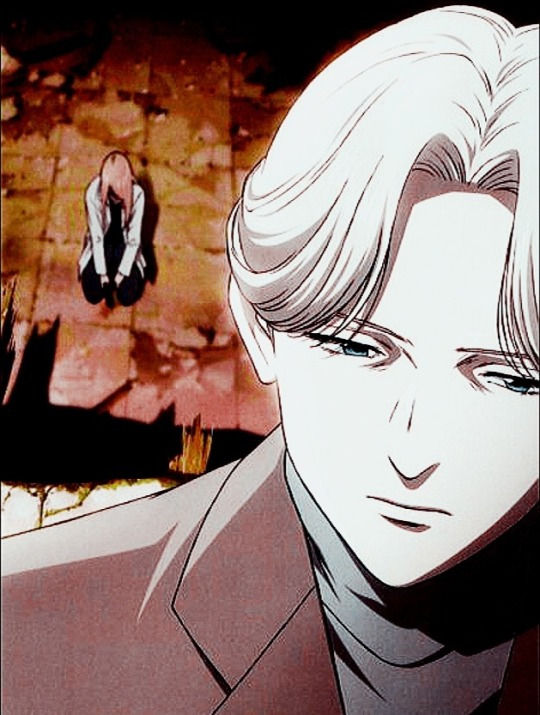
Everything Johan did was for Anna.
A “Monster” capable of love.

“What I’m most afraid of is…forgetting Anna. The strange lessons we have everyday… are making my memories fade. Please, don’t make me forget Anna. It’s only Anna and me in this whole world. Just give me that - please. Please.” – Johan Liebert”

I was very confused about the complexities of Johan's character up until the last handful of episodes. After rewatching the series for a 3rd time and exploring how Johan is portrayed in the manga, it became very clear to me that my initial opinions about Johan were basic and devalued the intricacies of Naoki's writing. From the beginning we are only TOLD by conflicting views, who Johan was. His character, in the fictional world as well as our own, is simply defined by an individual's perception of him and the story presented. However, if we dissect ALL of the themes and even the undertones Naoki presented to us through the world of characters; I think it would be evident that Johan was not committing heinous acts for superficial reasons such as simply being evil to be evil.
So what was the method to his madness?
I believe... Everything he did was for Anna.
(Yes this includes erasing himself from existence too )
Author's Note: I want to preface before you read on that although these essays are written in a sympathizing light that Johan has done PLENTY of wrong. This is not written in an attempt to dismiss his heinous acts lightly, but to simply understand the "Monster" of the series by tackling Johan's crimes deeper than the surface. I tried to make sense of Johan's every action in regards to his OVERALL PLAN and why Naoki presented them to us as viewers. For those who will nitpick the term "everything" quite literally, I want to make it clear that not E V E R Y S I N G L E A C T I O N Johan has taken coincides with his love for his sister; his actions towards the children specifically - because there are some things that had nothing to do with his "perfect plan" but more to do with attempting to build Johan's character and his view of the world us as viewers. Justifying ones actions vs. rationalizing ones actions are completely different. I am in no way attempting to discard the accountabilities that Johan should face for his actions, but instead trying to make sense of it all. I've analyzed Johan's crimes against children here: https://xprincessgarnetxvi.tumblr.com/post/691678531250487296/i-really-love-reading-your-essays-i-can However, this will explain the root of Johan's character and the core of his overall plan(s) that was committed for the sake of his sister from the very beginning to the end. The overarching theme and message of Monster is that there are no such thing as Monsters, only broken human beings capable of great evil; so we will humanize this great Monster in order to understand not only Johan Liebert, but the hows/whys Tenma/Nina was able to forgive him and ultimately find value in saving the life of this supposed Monster.

Before we begin, I'd like to take the time to thank you for reading! I can't wait to review your comments and further discuss this magnificent series of Monster!
-
Anna was set up from the beginning to become The “Monster” given she was the one who actually endured the experiments. Her tendencies are shown in glimmers throughout the show. The heartbreaking twist to it though... is that the only reason why she DID not become the beast, was because SHE ( unlike Johan ) HAD KNOWN REAL UNCONDITIONAL LOVE.
-Johan’s love and sacrifice is what kept her safe from the darkness he knew very well. He got his hands dirty to shield her. He chose to leave her behind in the care of her foster parents, knowing she would forget him, in order to heal.
He chose her than himself over and over; becoming her shadow; choosing to lose his only attachment to his already weakened identity in order for her to heal.
His love for her is why she never became a monster...and tragically, why Johan had.
Which reflects exactly what Mikhail Petrov (whose real name is Reinhart Biermann) said about his "PROFOUND DISCOVERY" concerning his current experiment on the children he had in his home; he said the children did not become animals because he gave them LOVE.

(Mikhail Petrov telling Grimmer how the children in his current experiment did not become Monster - it was because they had LOVE.)
In his own twisted way and view on things, he was protecting her. He killed every "parental" figure they had because he was betrayed by every adult figure in his life so far. People who mentioned calling the police, ended up finding out about their past - anything that could lead the man, who Johan referred to as “The Monster” into finding them, he disposed of.
The adults in their lives thus far would betray them, torture them, hurt them, throw them away- and forcefully separate them. In his severely abused mental state, any adult figure was a potential threat to his and Anna’s safety. So he’d kill in order to runaway from "the monster" and protect Anna. Then when Anna found out about the blood on his hands that fateful night the Monster paid them a visit, he realized that now he had become someone Anna feared - a different kind of Monster but all the similar to the one they were running from.
So he rationalized that now he needed to die.
In that moment, I think we should focus on his body language and expressions. Johan faced the ground. hardly picking up his eyes. His shoulders were sunken and he did not have that menacing little smile he usually had. Johan has killed in secret various times with Anna and back at Kinderheim.
So why was he so messy with the Lieberts?
Because he did not want to kill them - he said HE HAD TO.
It was not a calculated murder, because he was not truly calm and collected; He was afraid.
Lets not forget who Johan was up until that moment: the infamous little boy who provoked an entire riot and massacre by simply opening his mouth. With mere words he was able to sway the adults and children into doing what he wanted. BUT IN THAT MOMENT when Anna caught him red handed, he could not, or rather, would not - try and manipulate Anna.
(He has never once been shown trying to manipulate or abuse her throughout the entire series as he has done intentionally with the rest of the world.)
Instead, he asked her to shoot him and run - in an attempt to finally liberate her from the horrific life they had to lead up until now - blaming his existence for the constant chase their predator (Bonaparte) gave way to them as prey because in that moment, his memories were distorted and he believed he was the one who went to the Red Rose Mansion. **** (X) (this theory is challenged referenced below)
To Johan, him living was a danger to Anna and that night made it evident to him.
But when he was brought back to life and realized the gravity behind his methods, seeing how terrified Anna was of him - he started to cry. Because despite his initial feelings of finding his death absolutely necessary for her to be safe, he still wanted what he had with her; the only bond of love he ever knew.

What set his entire ADULT plan into motion (wiping out everyone who ever hurt Anna and created HIM) was Anna's rejection at the hospital. That was when he realized internally, he was beyond forgiveness and that he was nothing more than a monster. A Nameless monster in her reflection that needed to die in order for her to live in peace. (Referencing the God of Peace storybook. )

Johan was the one who gifted the God (Anna) her hat and then she saw herself as the Monster she was supposed to be due to the Red Rose Mansion experiments. This would NOT have happened if Johan did not give her the hat (the red hat which can symbolize the blood he spilled for her. ) so in this instance, Johan is also the reflection (you are me and I am you. They are both nameless monsters)

From that moment on, he wanted to wipe out his entire existence, and that meant those who ALSO "created" him so that Anna could heal as Nina.
I believe this is what is depicted in the Nameless Monster storybook.
Initially, we are made to believe Johan wanted to “consume everyone” so he would be the last one standing. The Monster known as Johan in the book also devours his counterpart, the Monster who went West and then there is no one left to call him by his name. But clearly, Johan never does this, because Johan never attempts to kill/devour Anna/Nina - because what it symbolizes is entirely different in nature regarding Johan’s intention.
A quick reminder that both Johan and Anna were considered Nameless Monsters. HOWEVER - by Johan’s hands, Anna does not remain “Nameless” nor does she ever become a “monster” the moment Johan decided to not only leave her behind in the hands of a loving family, but by her changing her name and her identity to Nina. The Fortners never made any implication that they knew of Nina’s past concerning the Lieberts murder and I believe this is because Johan introduced her as Nina to the Fortners and never allowed them to see the trail behind her identity as Anna Liebert.
Symbolically, Johan, as the Nameless Monster, consumed the Monster inside of Anna and became the only Monster left. This is what is mirrored in Johan’s intentions and the Nameless Monster storybook.
With Anna forgetting him and Johan leaving her behind thus losing his only connection to someone who truly knew him, now all that is left is Johan, without absolutely anyone to call him by his name - the one and only Nameless Monster.
And this is heavily referenced in Another Monster:

(This reinforces that Johan was trying to make Nina forget her past as Anna)
There wasn’t some sick satisfaction from any of his killings done when he was a child. To him, it was needed for the sake of her safety. This was Johan’s initial “plan.” set in motion. He wanted to be the only one left in the world with his sister - so that they wouldn’t have to be afraid anymore.
(I also believe at that point when they were kids, Johan's very first plan he referred to when telling Anna "Remember, I have a plan." was to run to another country with her so that the Monster will never find them. It is the only logical idea of a plan that a child could conjure following what he actually leads them to do, which was cross the border. Simply destroying the world is unreachable in his current state and Johan is smart enough to not be delusional in his endeavors. With that being said, he had to kill that old couple to erase any trail they may have left of "two beautiful blonde twins." But this plan fails because they nearly die at the Czech Border and was discovered. )

(Johan telling Anna he has a plan.)
RUHENHEIM:
One of the biggest moments in Ruhenheim has been misinterpreted and lost due to the mistranslations in both the English Dub and the Japanese subtitles.
I clarify and mend this by breaking down what Nina unraveled in Boneparte’s house when she looked at the portraits by correctly translating the Japanese script/text in depth here on this post:
But to summarize it for the purpose of this essay, it was revealed to us as viewers that Johan apologized to Anna when she returned from the Red Rose Mansion, revealing the overwhelming weight of guilt he carried when Anna had been taken that day.

(That day depicts the moment their mother made the terrible 'Choice')
and then Johan accepts his mother will never return to them (assuming she abandoned them) and goes on to tell Anna this:

Johan is the one crying because soon after, Nina tells us that Johan was in that room crying.
This information provides clarity as to why Nina was finally able to understand Johan, empathize with him enough to be able to forgive him. She remembered he was a boy who felt guilty over what happened to her; a boy who cried when he realized they were now all alone in the world. She understood that Johan desperately did anything and everything to ensure he and Anna survived despite it all.
That Rainy Night:
I want to GREATLY EMPHASIZE the important factor I missed my first time watching the scenes with Johan/Anna - the scenes shown to us were ONLY through her recollection as fragments due to her memory loss. They were told from what she COULD remember, so her take on what really happened that rainy night the first few times the events are unfolded before us should not be taken as absolute. At least...up until it is revealed in the final episodes that Anna realized that on that night instead of seeming like an empty shell of a person asking for death, Johan was crying and crying before she shot him.
The scene where Anna finds the portraits reveals what truly happened between them and its so important. She said “Johan was crying “here” just like before.” She was mimicking a memory she had just recalled in its entirety. “Why are you crying, why are you crying?” She sounded in distress. Directly after she reveals that she remembers him crying, it shows the image of him pointing at his head that rainy night.

Even though Johan told her to shoot him, it is IMPORTANT that he was crying and the author highlights this for a reason.
I believe that, finally being able to vividly remember that day finally revealed to her that Johan wasn’t the “face of absolute evil” she initially dismissed him to be; he was a boy/man who could cry and mourn - he was human. He was a terrified boy protecting Anna and himself the only way he knew how. and instead of showing him forgiveness/love - she added on to his collection of wounds scarred upon his soul from everyone else who chose to harm him.
Tenma...was ultimately the ONLY one in his life who showed him kindness.
Johan's intentions and reasons behind many crimes: Essay II.
( I will summarize it here as the extension essay was far too long to put on this post)
**** (☓) I want to ask, did Johan truly believe he was the one who went to the Red Rose Mansion or was that simply a masquerade he performed to make sure Anna did not remember?
(I wrote an essay on this being a possibility here: PART 2 OF THIS ESSAY. This will explain Johan's intentions in depth)
(this is a theory I FIRMLY believe and have completely adopted. But for the sake of argument, I will entertain both concepts behind Johan's memory in this essay.)
If we entertain the idea that Johan never misconstrued his memories about the Red Rose and pretended he did, I can dissect Johan’s intentions a bit more intricately.
Throughout the series you see that he is trying to wipe everyone who knew of what happened to Anna off the face of the earth, that included himself. He did not want Anna to remember. So when it was revealed she did remember, he mourned. It was subtle but evident in the anime when she reveals “you are wrong.” something in him shifted - for once he was reacting to the words of another.
She said "he had a smile but seemed like he was crying. I never seen such an expression on his face before." That entire scene, Johan’s eyes expressed something we’ve never seen from him throughout the series - a sense of mourning or longing?
Johan in front of Anna always appeared the most human and I feel Naoki did this with purpose.
(Naoki specifically told the directors/animators of the anime series to never stray from how he expressed Johan's eyes for a very important reason. )

Johan's expression finally meeting Anna after 13 years apart.
-
If, however, Johan DID truly think he was the one who suffered at the red rose mansion, his “perfect suicide” plan still relates to his twisted-selfless feelings for Anna.
Johan learns it was not him that suffered at the Red Rose Mansion...but Anna instead. and then Johan goes on to commit the "perfect suicide." In his plan to die, he wanted to take The Monster with him, forcing Bonaparte to endure the same exact hell he forced Anna to suffer as a child.
Call it an act of revenge. Some may think Johan is incapable of being vengeful but I cannot see this cruel and calculated act as anything other than malice. After Bonaparte was finally dead, the monster disposed of - Johan was ready to die.
But you can see his conviction began to slip away when Anna forgave him. What made it worse was realizing he was wrong about Tenma because even now, Tenma was still hesitating on killing him ruthlessly like he always presumed would happen. Johan thought he had humans all figured out - after all, all Johan has EVER known was the darkness in people’s hearts. That is why he was so confused/moved by Tenma and wanted so desperately to prove him wrong.
The manga portrays Johan’s expressions 1000X BETTER THAN THE ANIME. As soon as Anna arrives, Johan is just staring at the floor, unable to look at her - Repeating everything from that fateful rainy night when they were kids. But this time, Anna doesn’t kill him, she chooses love and compassion. and when she says she forgives him - his reaction is something the anime does not do justice
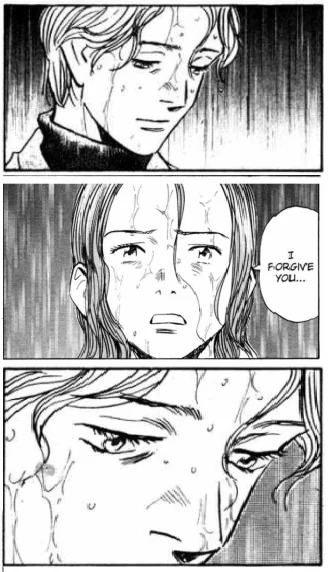
(The subtle shift the artist expressed in his eyes from her words is so significant but missed in the anime; but he reacts rather deeply, moved and shocked by her words.)
Because "Forgiveness is the remission of sins. For it is by this that what has been lost, and was found, is saved from being lost again."
In the manga he isn’t quick to reply. He ponders over her words carefully and I think this is when his mind starts panicking.
Anna realized that forgiveness was the one thing he wanted that night she shot him, despite him also thinking his death was needed. His value depended on her view of him; and what she once robbed from him was now returned - a human being worthy of forgiveness instead of a monster.

He is telling her the evident truth that he cannot turn back because he TRULY believes Tenma is going to kill him any moment.
Johan refuses her forgiveness not because he resents her or thinks its too late for her to redeem herself - but because he doesn’t think he deserves it. “There are somethings that cannot be undone.” Because it is too late, Johan is going to die - he WANTS to die. Then you see the fear and helplessness in his eyes after getting the one thing he always wanted [ Anna’s forgiveness] because he desperately wanted to die as the only thing he knew himself to be: the nameless, nonexistent monster. But both Anna and Tenma rob him of that by bestowing upon him the gift of compassion, mercy and empathy; for the first time treating and valuing him like a human being instead of a monster,god,experiment, devil etc., as everyone around him has his entire life.

(The Monster inside of Johan begins to crumble.)
Johan in his final moments was cracking and finally falling apart. You see it in the final expression he makes: the distraught, confusion and sadness. Because he realized, he was wrong about people, he was wrong about the world. But how can we blame him for his view on humanity when all he has ever been shown since birth was how ugly, selfish, cruel and inhumane people can be?
How can we expect someone who has only seen darkness to be able to find the light?
I want to clarify one thing I noticed: Johan has never shown to take any kind of sick satisfaction from killing unlike all the other serial killers being interviewed in the series. (aside from Richard) Specifically, Johan is without "the lust for murder" as Lunge explains in Another Monster - which is why Johan hired other people to kill for him instead. Especially contrasting Johan with Roberto, specifically, when Roberto tries to kill Anna.
(that is until Richard, which makes Johan's dealings with him stand out for a reason. He doesn't even take pleasure in killing the Red Hiddenburg, he leaves before witnessing her death instead of reveling in his 'checkmate' coming to fruition.)
Despite his callousness and his lack of care for life - Johan, despite how much of a "monster" he was, very clearly had humanity and had love....for his sister most of all. Johan saw when his mother choose, how little their lives meant to her and this instilled his nihilism at such a young age. He watched Anna get tossed to the wolves like nothing and in that moment, he probably thought his mother chose Anna over him for a reason. (even though the question on her intention would haunt him for the rest of his life) But her being able to choose is what hurt him the most and it's probably what instilled his self sacrificing mentality to care for Anna above the world in order to never make the same mistake his mother had.

That is why after she got back from the Red Rose Mansion, he cried for her story and apologized as if it was his responsibility to feel guilty over what happened to her. It should have been him that suffered. Then after, he treats her with the upmost care, telling her everything is hers, no matter what she will win everything because he would deem it so. He is kind to her, never letting go of her hand even when she is dragging behind - he sacrificed all of himself for her...
Because she deserved everything in the world to contrast their mother throwing her away.
(it should be noted that the Lieberts did not want Anna either but only adopted her because Johan refused to leave the orphanage without her. Which is also why I believe he killed them when Bonaparta came because he thought the Lieberts were conspiring with Bonaparta to get Anna)

🌰 (The ‘Acorn game’ represents their Mother's choice, a child in each hand. But in this version, Johan would ensure that no matter what hand Anna chooses, she will NEVER choose wrong. He manipulates the fate behind her choices by holding two acorns instead of one; never letting her make the same mistake as her mother.)
He wanted her to know above all else, she was loved.
A clear indication of this adoration/attachment he has for her is the fact that he DOES NOT forget her even after enduring the hellish experiments in Kinderheim that aimed at wiping out / messing around with his memories.
-
I wrote this because I was astounded to see various posts/Wiki pages implying that Johan’s intentions were to torture Anna and make her kill herself. Telling her to shoot him was his first attempt to drive her insane? They twisted a lot of things Johan did to try and make this statement true. But I cannot comprehend how they drew this conclusion? The series has characters mentioning on more than a few occasions that Anna is dear to Johan. "He is lost with you."
Everyone knew Anna was important to Johan, Professor Geidlitz was the first to mention this besides the old blind man. Roberto was aware of this which is why he tried to kill her as mentioned in Another Monster. Which is ALSO why Peter Capek tried to hold her hostage to prevent Johan from killing him.
and for the first time, Johan DOESN'T kill him.
Johan cried when he awoke at the hospital after he reached for his sister and she screamed in fear of him. His face full of tears - his heart completely broken. If his intention was to drive Anna insane, he would have triumphed in that moment she screamed and fell to the ground after he reached out to her. But instead he mourned.
Anna has mentioned several times that Johan has cried for her, like when he was in the room full of their happy portraits, he was crying. He never once tried to bring harm to Anna - not intentionally towards her person. Explaining the Fortners murder - either he killed the Fortners after they decided to keep lying to her, thus keeping him in the shadows when he wanted to return. OR he killed them because they were going to tell her the truth about her identity, which was something Johan worked to conceal. (this theory is explained thoroughly in essay #2 )
Regardless, if he wanted to torment her, he would not have tried to lure her away to the castle when he set up the Fortners to be killed.
They imply that Johan wanted to torture her and then kill her at the end. But that makes absolutely no sense. Where in the storyline does Johan give off this tendency towards her? Even at the end he told her where to meet him in Ruhenheim and not once did he try to shoot her or Tenma. Honestly, if he really wanted to provoke Tenma to shoot him, he would have held the gun to Anna instead of a random child. But even though being shot by Tenma was his greatest endeavor, he refused to point the gun at someone who was important to Tenma...because Anna, is important to Johan too.
To say Johan, despite being hailed as the Monster of the series, had no love or humanity in him and was merely the Devil himself...completely missed the point of the story...
I’d like to point out the constant mentioning of Hitler in this story and draw another important factor...Hitler brainwashed people to commit mass genocide. Under his rule, millions perished in horrific ways. But despite that...Hitler was capable of loving others. Hitler was also loved by others. The terrifying truth about people who commit atrocities...is that they are not monsters or demons or devils...
they are merely human.
-
Here’s two passages from ANOTHER MONSTER [novel post Monster written by Naoki] that really drives this point:


- PSA: My twin brother FINALLY finished his 2 HOUR Johan Analysis Essay, that dives deeper into Johan's character. This essay and essay #2 will be included in this analysis video as we both worked on it together. However, this lays out the details visually and with beautiful music. Please watch!
youtube
#anna liebert#Nina Fortner#Johan Liebert#Naoki Urasawa's Monster#Monster anime#Naoki Urasawa#Anime twins#Dr. Tenma#Kenzo Tenma#Franz Bonaparta#Leovoid#Johan#Liebert twins#Monster meta#anime meta#Youtube
247 notes
·
View notes
Note
Hi,
I see you finished Monster and are quite versed in Johan. Can you help me understand the depth of his character better? I feel like many people miss the point of it. Also I'd like to know why you like him so much.
Oh, there is so much to say about him but i will try to make it short as possible.
Lets Talk About Johan;
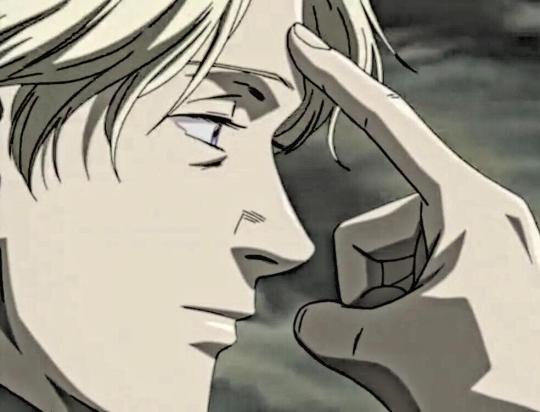
First of all, i heard his character as some 'evil' mastermind so i wasnt really interested in his character until i experience the story by myself. I wondered why this series is popular so i decided to give a chance. I tought Johan was like Afo (from Bnha) but he turn out to be a lot like Shigaraki lol.
What makes a character depth is if they are not one-dimensional, that there is a more than how they seem from surface. And Johan fits well since he is mysterious character who is seen as angel, monster, devil, basically anything but human but they end up failing to understand him because if he was so simple, police would've catch him a long time ago.
At the start of series, he seems like your usual dangerous serial killer which fits the psychological thriller theme of story. And one of the best thing in series is his connection with Tenma. A doctor saves his life and this dangerous killer starts to view him as parent figure. A killer who see no worth in life and the doctor who thinks every life is equal, especially saving Johan is the reason he starts to to be able to live his life as a real doctor. Only to learn the child whom he saved turn out to be serial killer.
Tenma feels responsible for this and goes to journey to kill Johan. During this journey, we aldo discover some hints of what made Johan the way he is. The irony is we get the hints and a lot of characters perspective of him, everyone except Johan.

Is his messages about 'the monster inside of him' serious or not? Tenma assumes Johan is enjoying this at first, then he assumes Johan has multiple personality disorder. And later when he talked with other doctor, he assumes Johan is just playing with him because thats what most serial killers do with police. This is interesting because all of those end up being wrong. Johan doesnt enjoy from killing people. Johan doesnt have DID. Johan didnt write those messages to play with them. We know this because we later learn that he is unconciously imitate the fairytale stories he read as child.
Meanwhile, he has fanclub. A lot of murderers admire Johan because they view him as destruction Buddha. Just like others, he is seen as monster but why though? Its not like he is the only killer in the world. And personally, a lot of characters are more 'evil' than him so the thing about Johan is; he treats human life as nothing. Not just other people but also himself. Thats what makes him so scary to everyone. He doesnt even do it out of joy, money, statue. He looks like the devil in human form. He spreads misery to world. (Thats why he burns library when they said "its humanity's treasure" LoL.)
To people, that is scary. When they look at Johan, his eyes, the see someone who has no identity (nameless world). They see someone who treats life like as a game. Which explains why many people are afraid of him.
Some also want to use him, such as they want him to make second Hitler and he is like 'Nope'.
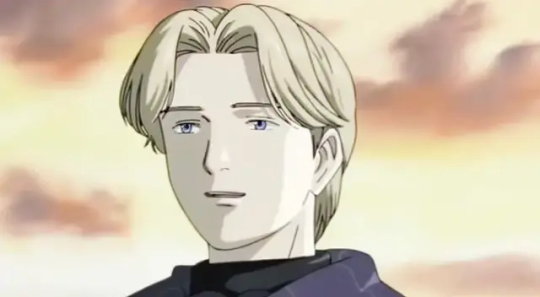
I think the main reason i love Johan is that he is like a magician. He can create a beautifull illusion. He is someone who can touch people's hearths because how well he understands them. Which is why he is seen as angel when people dont know he kills people.
This is also why he can use other killers for himself. He can see their vulnerabilities. Because even a killer is still human and they might need acceptance, to be understood by someone. Johan can give it to them. And they wish they were like Johan because they think everything would be a lot easier for them to kill others, like some kind of edgy teens. They fail to understand the person they want to be is extremely miserable.
On other hand, Johan can use his skills with curing people. Such as him waking Suk's mother, he made her remember her son again. Though he does things with ulterior motives, same skills can be used for good things. He can make people happy or miserable by little things. With a little magic or just skill.
And even though he is villain, he has very relaxing voice. He is very elegant. He listens other people. This fits perfectly well with his manipulative character.
We also never know when he is sincere or not because when you think he doesnt he actually seem to care, such as when he cried for Karl. Apperantly, tears were real. He is always in his world, its so funny when you think about he is some kind of mastermind.
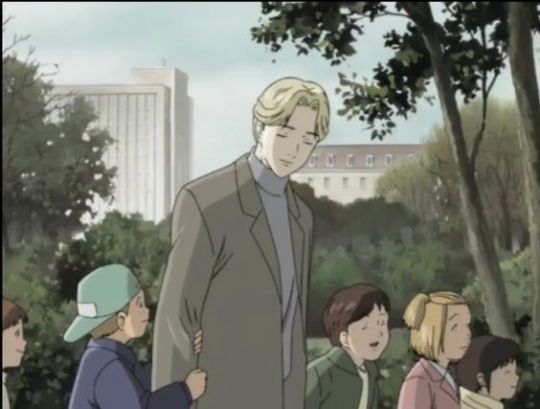
Also his interaction with kids is so interesting. I think he geniuely enjoys being around them. Otherwise, why would he bother to spend time with them, why would he know so much about child's rights, why would he look for picture book for a friend? This is the same guy who encourage kids to rooftop game (and the scene where he was projecting on Milos) which is messed up. It gives me chills. His nihisilism, him viewing life as game end up resulting him expressing love as twisted.
----
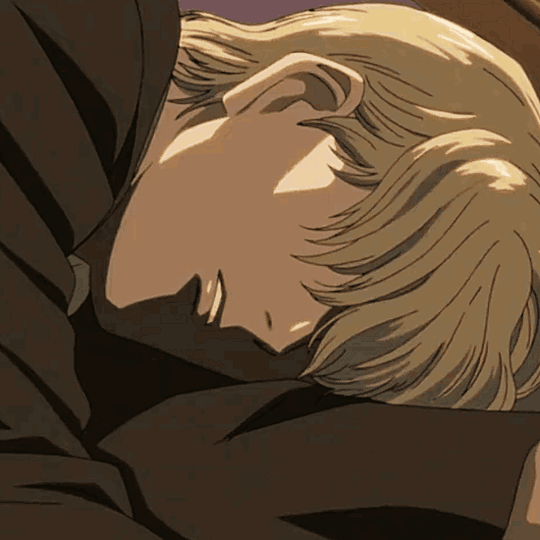
Later, everything changes when Johan finds certain book in library. Basically, Johan's character doesnt necessarely stay same during the series. He changes his motives from unconciously imitating nameless monster stories to find actual monster who ruined his life. Even though he does messed up things, everything about his character makes sense with that scene. Johan geniuely believed that he is nameless monster. Johan geniuely believed that he doesnt exist.
Everything about him makes sense because it explains why he doesnt think death as much of it. Because if someone doesnt exist, they cant be killed. If someone doesnt exist, they cant be responsible for killings. He is detached from reality. Its not that he didnt feel. Its that he doesnt view it as real the way other people does. Because Johan isnt there. This is the tragedy of Johan's story. He doesnt have name. He doesnt have identity. He feels as he doesnt exist.
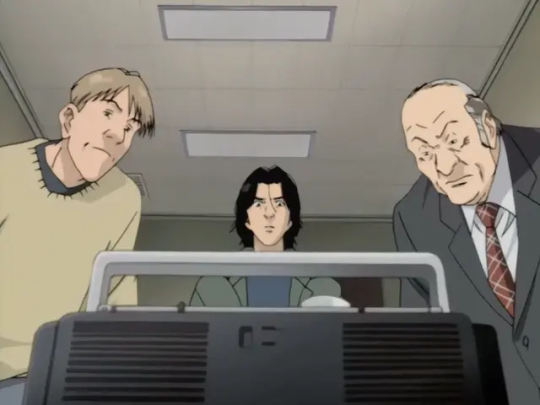
The famous 'monster' tape everyone after is about a child unable to see the difference between fairytale story and reality. 'My name is Johan. My name is Thomas. My name is Hans. My name is Otto.' He is them but he is neither of them. Johan views Anna as his half, as Anna is the real one and he is fake copy. He killed people as child, not because he is evil but because he geniuely thought that monster is coming after them. He cant even separate his own memories from Anna's. He takes all bad memories both to protect Anna and other reason is to become someone. He wanted to have identity, he wanted to live so bad but he didnt have on his own so he took it from others, just like the nameless monster.
This is also why Johan is also affected by Tenma's saving him. He probably wondered Tenma wouldnt save him, if he knew he was monster. He was kinda right because Tenma regretted his decision but he was wrong because Tenma couldnt shoot him and he saved him the second time. He showed him that he has right to live, he has right to exist, and that he has a name so he is not monster. This is why Johan can open up his worst insecurities. And they really give father-son energy and i think thats cute. I am glad that even after years Tenma visists him at hospital.
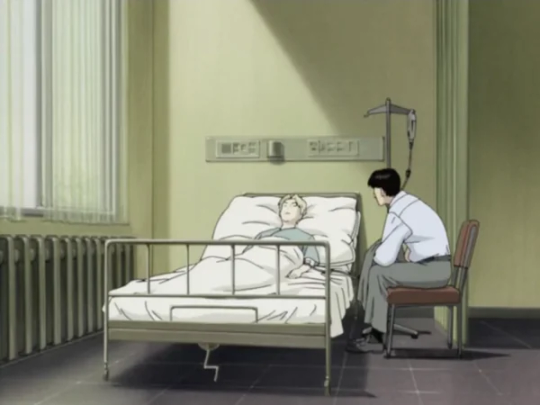
And we can guess what happened at the end thanks to Grimmer (one of the characters who deserves better), 'The monster become human at the end'. and Lunge said that if he were not a human being, he would not leave a trace, only humans leave a trace. For the first time we see Johan leave his mark. So Johan is no longer a monster, just a human. Also, his real name doesnt matter, he is Johan to us/all.
I love the messages of story. There is a monster inside all of us, but we can contain/heal it and after all, we are all human, our lives are equally valuable and stealing a person's name is the biggest crime, so having a name is very important. Story still has certain writing issues but generally, it is good story. Johan is well written character because his story is such a journey. We cant even really appreaciate the story without fully understand Johan. Every scene he is in meaningfull. And personally, i think his story is very empathic because of how tragic he is. Also sometimes he looks so funny and weird which makes him entertaining. He is such a good character.
Though you are right, anon. Many people still misinterpret the story, especially his character but anyway, there are still people who makes great analysis about him. Such as this analysis made by @cyanogoth.
Its ironic that most/some main villains have the most interesting and sempathic backstories, even though they are supposed to be 'big evil' or something but in reality, they are not really.
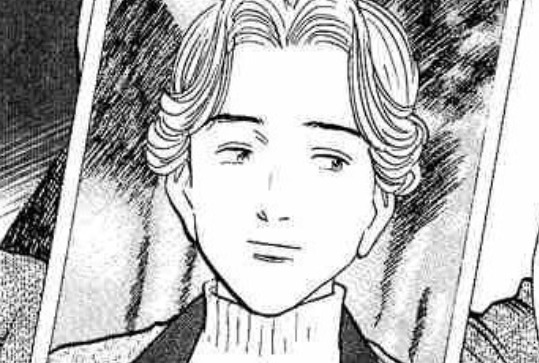
Anyway, he is fun to think about, i love him, lol.
#anon ask#johan liebert#tenma kenzo#tragic villain#naoki urasawa's monster meta#monster meta#monster#monster analysis#character study#character analysis#monster naoki urasawa#naoki urasawa#naoki urasawa's monster
78 notes
·
View notes
Text
Thinking about the similarities of Johan and Shigaraki's never-ending hatred/nihilism to the world, though Johan leans more to a less firey disposition? His perception of the world and existence is that it's worthless/meaningless, though he's equally as, if not more at times, destructive in every way possible when wanting to achieve a goal. Not too sure about Shigaraki so far since I'm only on season 3 of MHA, in comparison to finishing Monster. I do however note that both their relentless fervour to destroy is rooted in severe childhood abuse from people who wanted/wants to groom them into a weapon for their own selfish gains, completely dehumanising them during their most critial stages of development. Icl I think the Cezch twink could make Shigaraki cry with the most devastating monologue about his family like he did to that poor orphan boy Milôs. I'd like to hear anyone's thoughts about these two if yall are a fan of both Monster and MHA.
#its nearly 4am over here but I cannot help but think of these two#the genres are different completely but like#they're interesting to me#reblog#bnha#mha#bnha shigaraki#mha shigaraki#monster anime#monster naoki urasawa#naoki urasawa#johan liebert#analysis#bnha meta#monster meta#george's ramblings
7 notes
·
View notes
Note
first of all, in typing I just realized they all have one (except tenma technically but he does have closure with eva) but you think if Grimmer/Lunge ever ran into their ex-wife again they'd speak to them?
Oh, that's a fun question! I'm going to run with the assumption here that they are aware of the presence of their ex-wife but have not actually made contact yet and the ex-wife has not seen them, since I think if the question was "would they talk to them if they actually ran into each other" it would be an easy yes. But under these conditions...
I would say definitely yes for Lunge. While things ended very badly between himself and his ex-wife, and even his daughter, we do see closure with the latter wherein he's started to communicate with her via email. I think that it's meant to hint at him wanting to repair things with her and, if not have what he once did, at least be a part of her life. As far as his ex-wife goes, I think Lunge knows that wasn't working out and would not want to pursue mending things in the same way, but rather if he saw her, he would want at the very least to know how things are going in her life, and for her to know how his life is going. For him, it's a sort of formality in their separation. After that, though, I don't know that he would want to communicate with her. It would feel improper to him when they've finally put to rest the fact that things are over and their chapters together have finished. Lunge has always seemed to be the sort of person who, if someone is "out" of his life, can easily let go of them.
For Grimmer, it's a little complicated. I actually see him as a sort of strange inversion of how Lunge would act, in that it would be more difficult to get him to actually reach out to her, but if he did, he would be more inclined to hold onto her as someone in his life - maybe not through prolonged communication, but as someone he thinks about. I think with Grimmer, what would hold him back from ever communicating with her is the fact that he feels he ruined her life. He married her because it was the "right" thing to do for his job as a spy - something that hurt her terribly because she could never get the love that she wanted. I honestly think that Grimmer might feel she would be better off never seeing him again. Trying to come back from that, even with his newfound access to his emotions, would only hurt her - and he wouldn't want to drag that back to the surface for her. Even more so if she's remarried and seems to be happy. Now, if he saw her and she looks miserable, I do think he would readily approach her. He doesn't want to be liked by her at all, but as a more empathetic person than he was at the time, I think he would want to try to help her feel better, if possible. And if she wants nothing to do with him and continues to hold a grudge, well...she's allowed, and he won't ever bother her again.
In the end I think they both want closure with their exes - it's just that for Lunge that closure would be very much final, and allow him to no longer think on her in the future, whereas for Grimmer she would become yet another lens through whom he can contextualize his personhood. And if she responds positively to him, then the potential of becoming a friend is something he would entertain.
#naoki urasawa's monster#wolfgang grimmer#heinrich lunge#asks#dernarrleid#monster meta#this was a very fun one to think about especially in the context of the types of people lunge and grimmer respectively are#both are kind of avoidant in their own way but Grimmer I think is more innately sentimental than Lunge#and is driven to heal harms when he sees them#to Lunge his ex wife made it clear she wants nothing to do with him so while his time with her is an important part of his life#that is over now and its best for both to move on#mmmmm tasty grimmer and lunge analysis
21 notes
·
View notes
Text
I think Johan was so intended to die that day because he was convinced that he is monster but Tenma saved him and he wondered; 'Would he still save me, if he knew i am monster?'. Then at the end, Tenma saves him again, showing him that he is not monster and that he is still human who has a right to live. No wonder Johan was so affected by him.

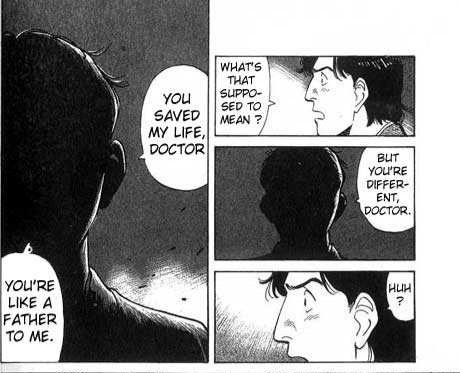

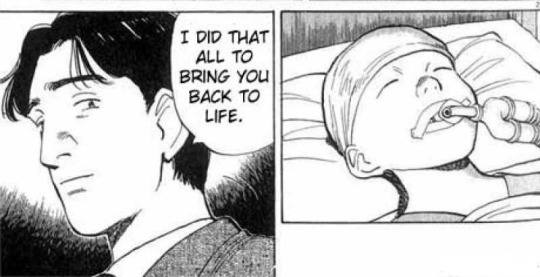
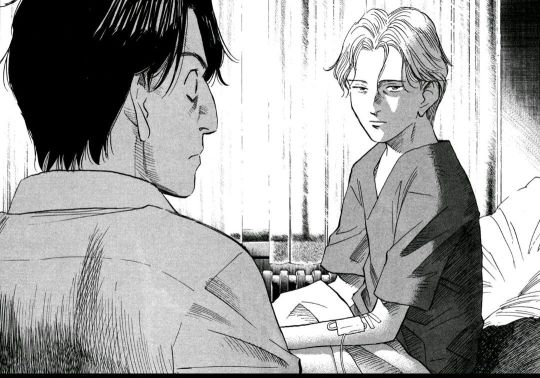



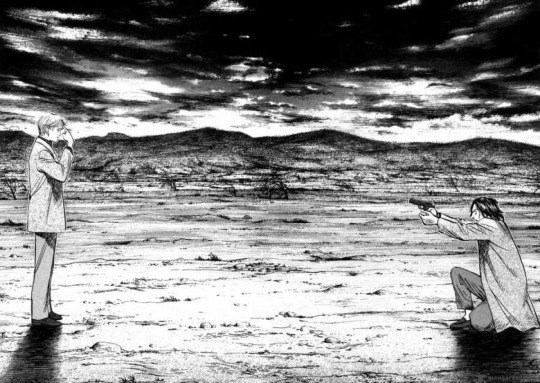

AND THE BOY HEARS LOVE | monster | alice munro, face // joan tierney, interview with the machine woman //westworld 2x10 // julian randall, icarus imposter syndrome // florence welch, useless magic: lyrics and poetry
2K notes
·
View notes
Text

Expertise can't help you here.
#dungeon meshi#kabru#laios touden#falin touden#Happy Thistle Thursday once again. Have I been holding on to this comic for several weeks? Sure have!#I forgot how long it takes for Chimera Falin to come into play.#I still really love my 'better drawn' art of her - unfortunately it was several weeks too early for the anime only folks.#Slowly getting the hang of drawing Laios. I don't know why I struggle so much but I am getting...somewhere.#Meta time: God damn I love how the chimera shows off the expertise and gap between Kabru and Laios.#The truth is: they are both *right* and they are both *wrong*.#This creature is a combination of monster and human and they only have the skillset to deal with one of those.#Kabru goes for all the human vitals - but she isn't human.#Laios tries to approach her as a monster and is struck down by the humanity he sees in her.#She is something new that defies what they *both* understand about the world. And that makes her such a perfect antagonist.#The damsel was the dragon all along!#...She is really so cute though. Terrifying! But adorable. I am so excited to see the boom of fanart for her.
47K notes
·
View notes
Text
jason's 13 years at the super disciplined camp and several years as a leader of said camp mean it is very unlikely that he is any shade of feral, except for maybe a few minor idiosyncracies that all camp jupiter kids have because they all spent time at the wolf house, but since they all have these traits, they might be considered cultural rather than feral. however, annabeth chase, who was famously left alone until she was seven and was raised by an ancient greek horse man that used to live alone on a mountain, a barely sober god of mental illness, several other mythical beings based on animals, and approximately 37 different traumatized, exhausted, and desperate teenagers at an unregulated summer camp where she learned how to be scary by studying greek monsters, would definitely be somewhere near feral.
#this is me coming out as a feral jason grace hater. he is constantly two things from an OCD meltdown because he was raised to be uptight#annabeth however is and was a little gremlin and you cannot convince me otherwise#the older campers were supposed to babysit her and they came out looking like they just left a war. literally all she wants to do is-#run into traffic on the off chance she finds a monster. the only person who can get her to sit the fuck down and not bite people is luke#pjo#annabeth chase#percy jackson#jason grace#percabeth#heroes of olympus#pjo hoo toa#percy jackson fandom#hoo#pjo fandom#pjo series#percy jackon and the olympians#annabeth pjo#pjo meta#percy jackson meta#mine#my meta
5K notes
·
View notes
Note
I just can't wrap my head around the narrative purpose of Nina. Her characterisation was lacking, she didn't leave any memorable impression I even forgot what she was about other than a leverage for Johan or a refuge in a way.
Her motives were not really mapped out well I feel like the author could've expanded on that more. It overall left a bad taste in my mouth.
What do you think?
About Nina;
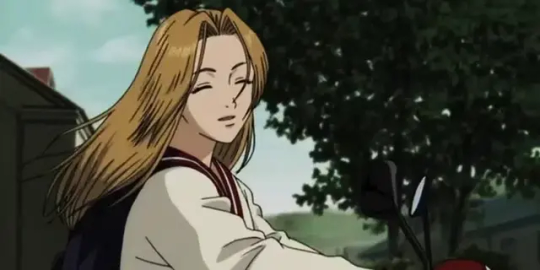
I agree with you. I read a lot of Nina metas and i understand what she was supposed to symoblize (Nina; human, Tenma; God, Johan; Devil) but i think Tenma fits the role of human anyway and it doesnt work in Nina's case because she is not some random victim whom Johan killed her parents. She is her brother so her forgiving him at the end (especially when she already forgave other villains) doesnt work out as 'act of love'.
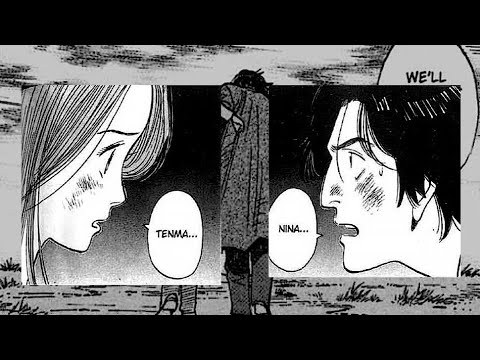
So the reason I think she isnt much memorable to you, thats because she is too similar to Tenma during the series.
They are good people who helps others
They investigate Johan separately but somehow at the same time.
They both project their inner monster on Johan so they think killing him will solve everything
Both use guns
Their interaction with Dieter is same
Everyone loves them
They are the only people Johan cares about and only people he lets them live Though Nina is different, her personality is more expressive and extrovert but this side of Nina is barely seen. Only at the beginning and ending. Tenma's character and ideals makes sense for his character because he is a doctor, also why he is obsessed with Johan but Nina as Johans sister, she couldve been different. More personal, more obsessive.
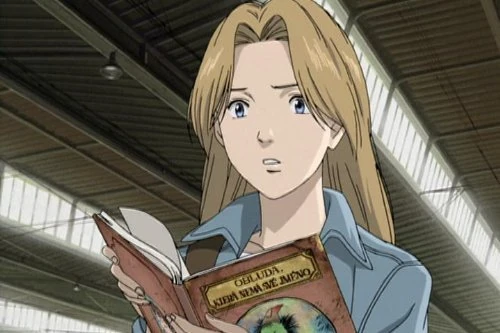
This is the problem with writing "good people". Her place in story is also mess and kinda replacable....yes, even though she is Johans sister. When i said replacable, i mean a lot of scenes were just there. Even if she wasnt there, nothing would change.
After not being able to meet her, Johan never go after her. He is more obsessed with Tenma, not Nina.
After escaping from her brother, she didnt need to meet Neonazis. Another character would stop the bomb and Tenma would see Johans writing anyway.
Her training from sugar man is just side character story, couldve been Tenma and same with meeting old cop. It couldve been Tenma who met the guy and nothing would change.
Even if Nina didnt come library, Tenma still wouldnt shot Johan. Her "dont shot him" scene with Nina has no build up and cringe. Johan didnt even interact with her at all in that scene and Nina also doesnt attempt to talk with her brother. She literally acts like random cop who suddenly appeared in the scene.
Other characters learnt "nameless monster" book, or 511 or the mansion etc on their own.
Nina remembering her flashbacks, or learning other book stories etc was important information only she knew but she never shared those informations with other characters. Its almost as its just written for audience to learn, to understand Johan.
Her interaction with Johan at broken house, that was meaningfull. That was only them after all but that scene didnt change anything for Johans plans. Johan was already remembering his memories and planning his suicide anyway. Only usefull information is that Nina found out Johan will kill himself but neither Nina and Tenma cared that information enough to do something different. Then at the end everyone find a way to find Franz's town.
At the end, another usefull and important flashback we get with Nina. Only Dr Gilleun heard this but its not like he did anything about it. Then Nina ran to Johan and told him she forgave him. Of course. Of course, it is important but its not impactfull (for audience) if Nina can forgave other characters. And once again, this doesnt stop Johan.
And no, Tenma wouldnt shot Johan even Nina didnt come. Even Nina didnt tell him to save Johan later, he would still save Johan. Literally any other character could say that.
And at the end, Nina lives her life again just a normal girl. Tenma is the one who is with Johan and his words 'You had a name' is what saves Johan at the end.
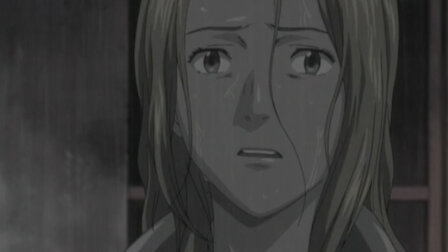
I am not saying she isnt important character. She is but as character, she didnt change things much, even though she shouldve as main heroine. She shouldve played more role that affects things around her, especially her interaction with Johan. But it didnt.
We could maybe say the same thing for Tenma or other characters but not really. There is already a certain role Tenma symbolize, humanity, saving lifes and most other characters are just side characters. But thats the thing. Nina isnt meant to be side character. She was supposed to be main heroine but even characters like Lunge and Eva, even they mess up or dont do much, they are still more memorable because their invidiuality shows itself. They affect the storyline in their own way.
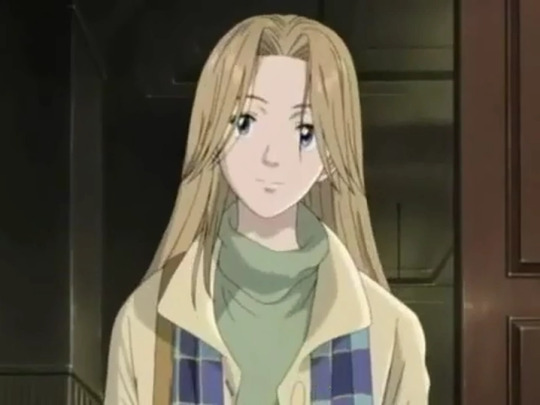
I think we shouldve seen her inviduality more rather than her just going after on her own. I mean, on her own way, different than Tenma. Most importantly, i wish we shouldve seen her love for her brother, her family (Fortners) but her connection with them, our connection with people shows us who we are. Maybe she shouldve traveled with Tenma, then their connection would makes sense. And definitely we shouldve seen more about the her connection with Johan and her memories as Anna and after remembering, it does affect her so she shouldve done something to affect things around her as Nina, as heroine but none of these happenned.
So i understand why she can be forgotten because we dont see much of her really. And thats a shame. I wish she has done more, and more on her own way, more different than Tenma, more personal because its her brother but she acts like they are strangers so well. I think she isnt well written.
#anon ask#writing criticism#monster meta#monster analysis#monster naoki urasawa#monster#naoki urasawa's monster#nina fortner#anna liebert#johan liebert#tenma kenzo
55 notes
·
View notes
Text
Its a nameless world what they see in Johan's eyes. Someone wh ocouldnt exist because he didnt have name, he wasnt treated as person ever until the end, its both a gift and punishment for him to show this to certain people in the story. Its his only expression of love.
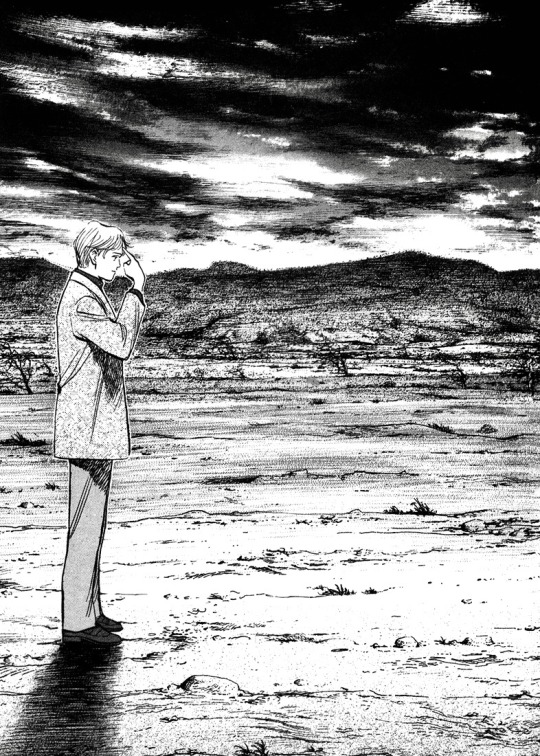
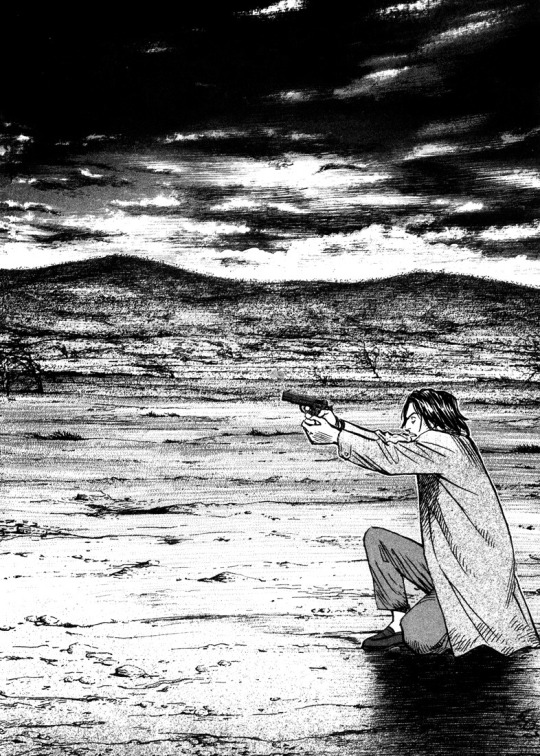
Monster (モンスター) // Naoki Urasawa
2K notes
·
View notes
Text
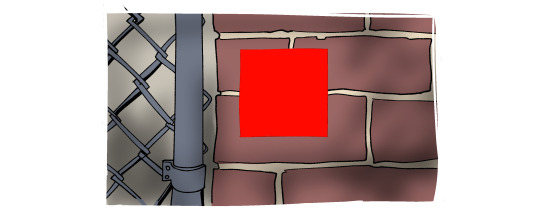
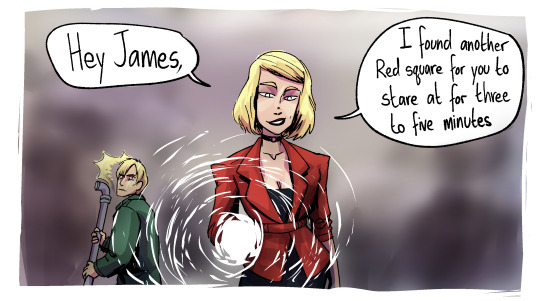
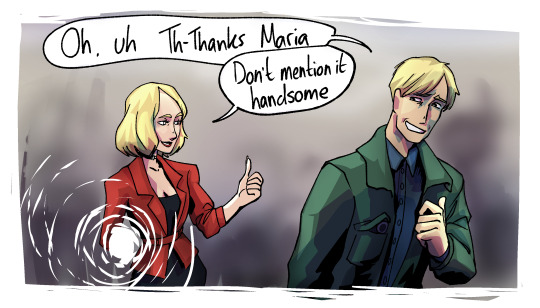
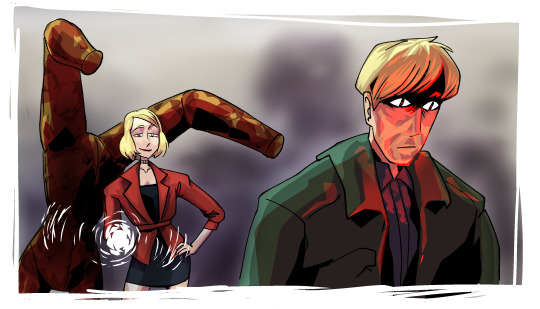
She's so helpful in the remake isn't she?
#lemonspades#my art#silent hill#silent hill 2#silent hill 2 remake#silent hill 2 remastered#james sunderland#maria#maria silent hill#sh2#sh2 maria#silent hill remake#mary sunderland#silent hill leg monsters#silent hill series#we watched gab play it#there's a line where Maria comments on how james spaces out durring saving#a fun little meta jab it feels like the town is playing with XD#lol it would have been funny if she started “helping” especially since this James is so UNCOMFORTABLE XD#Uncomfortable james
5K notes
·
View notes
Text




We don't talk about the scar
#twin runes#twin runes mini#undertale#deltarune#crossover#utdr#kris dreemurr#frisk#asriel#my art#people have been asking about the scar a lot#so here you go#asriel pointed it out#it's meta because some readers keep confusing it for body hair too#being a fuzzy monster must be horrible#the amount you fur you'll have to shed...#gross#i wonder if anyone noticed that frisk doesn't brush their teeth#they're just chewing on the toothbrush#after runes
3K notes
·
View notes
Text
Naoki Urasawa's manga "Monster" Interview;
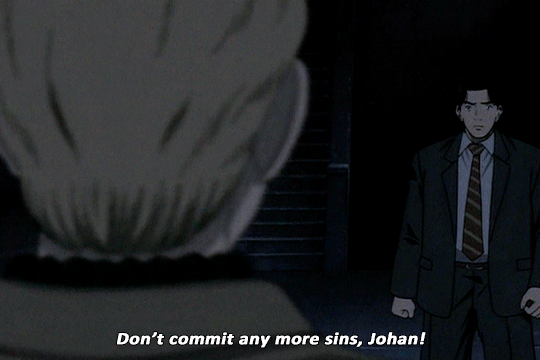
Naoki Urasawa is one of the most successful manga artists in Japan, having not only been awarded the most important prizes in Japan, but also in Germany. He celebrated his international breakthrough with the thriller series "Monster", which he drew in the 90s. It's about a Japanese neurosurgeon in Düsseldorf who saves the life of a boy and gives up his career to do it - actually he should have operated on the mayor instead of the boy - and then gets into real trouble because he is involved in a series of serial murders and a conspiracy device. Andrea Heinze : How did you come up with the idea for the series? Naoki Urasawa: The drama “Monster” was created because I really liked the novel “Frankenstein”. That really interested me and I thought about whether I could bring the story into today. The second aspect was that at that time in the USA there was this film with Harrison Ford, “The Fugitive”. It was about a doctor whose wife was killed and I really liked it. And then I thought, I have to do something that involves a doctor who is being chased and has to solve a mystery. And then I was interested in “Frankenstein,” this old Gothic landscape, and I wanted to bring the two together somehow. And then we somehow came across Germany. Blonde boy as a contrast to evil Germany
I heard that people saying Johan was inspired by Hannibal and other psychopathic characters etc but it never make sense to me. (Maybe some characteristic sides makes sense but generally no, he is different). It makes sense that Monster is inspired by Frankenstein story because Johan is portrayed as more like someone who became the way he is because of his past. He is the monster created by the real monster. (Mostly its Franz Bonaparta who stole his and many others name, biggest sin a person can do). Its really combined between two stories because Tenma wasnt/isnt wrong to save Johan.
Heinze: And what does Germany have to do with it? Urasawa: I wanted to do something dark. And I don't want to say that Germany is the root of all evil. But if you look at the Second World War - and this is present in Japan, also because Japan was an ally of Germany at the time - there were a lot of dark stories in Germany and also in Japan. A lot has been clarified. But some things don't. I also came up with this beautiful, blonde, blue-eyed boy as a character. I think that's a good contrast to contrast with this dark, bad thing. And the more you delve into history, the more clear it becomes that the roots of the conflicts lie in the Second World War. If you add all of that up, the manga could only take place in Germany.
I am glad that real life stories was brought up but its really sad that this actually happenned somewhere.
Heinze: How did you research the story for “Monster”? Urasawa : I watched a lot of documentaries. In the 1990s there were also reports of neo-Nazi attacks on houses where Turks lived. I've seen things like that and they've also found their way into my story. I made up the rest. For example, the boy, Johann. He is raised in a children's home where many human experiments take place. And shortly before I finished my work "Monster," there was a documentary on Japanese television about the end of the Nazi era, and it also reported on a camp in which blonde, blue-eyed young people were herded together and essentially had to undergo elite training . And this boy who was depicted there was also called Johannes. I was then asked if I had known all of this before - but that wasn't true, it was all in my imagination. A person becomes a monster
This is insane....chills. Its so ironic that a lot of people remember Johan's character as some evil psychopath but not only he isnt written that way in story but also, his origin is literally coming from actual victim, a child. Intentional or unconciously or maybe coincidence but still, wow.
Heinze: How is it that Prague also became the setting for the story? Urasawa: Because everything that was east of Germany, all the Eastern European countries, was not even known in Japan in the 1990s. It's completely different today, but back then people hardly knew everything that lay east of Germany. While on the other hand, Germany and everything further west was already developed for tourism. And Eastern Europe had never been featured in the manga until then. It also fascinated and really attracted me as an illustrator. If you go to Germany or France, it is much brighter in the evenings. But if you go further east, in my case it was Prague, it was much darker on the streets in the evenings in the mid-90s. And I wanted to explore this darkness, this night, for myself.
No wonder story feels so real, with both its characters and places.
Heinze: What does the manga “Monster” have to do with Mary Shelly’s novel “Frankenstein”? Urasawa : Frankenstein is about a scientist who created a monster, and it's also about human responsibility. There are certainly things that humans are allowed to do and that they perhaps shouldn't be able to do. These thoughts can certainly be taken further, and that's what I did in the "Monster" series. It's about the Japanese doctor who saved a boy, and later the boy becomes a monster, a murderer. And then the doctor asks himself whether he is not responsible for the fact that this boy has become a murderer. This is a different conflict than in "Frankenstein", but the question of responsibility for one's own actions is also an issue in "Monster". Dostoyevsky novel using the means of manga
Though, story is inspired by Frankeinstein, Tenma is clearly right to save kid's life. He isnt the 'evil' doctor who is responsible for the monster. He is the real doctor who saves this boy from destruction at the end.
Heinze : For me, this doctor is an ideal example of the good in people. He even saves this boy against the wishes of the clinic management, who would much rather use their best surgeon to operate on the mayor. Urasawa: Every good person has places somewhere in their hearts that are perhaps not so good, and it was the same with Doctor Hämmer - in the hospital there were also some disagreements with the management, where he also thought: "Preferably I would like it if everyone were dead." And later Johann also tells him: "I have fulfilled what you wished for." Then the idea came to him that he had also caused all of this and was to blame for it. And I wanted to show in my work that there is something good and something bad in every person, and that is just human nature. Also, what I didn't mention: There is the classic manga "Astroboy" by Osamu Tezuka in Japan. There is a scientist whose son died and he then creates a robot that looks like his son and that also has feelings. But somehow he says: "You are not my son." At some point he neglects this robot. This scientist is basically Doctor Tenma. So “Frankenstein” and “Astro Boy” are the two sides that belong closely together. I especially consider the artist Tezuka with his classic “Astro Boy” to be my roots.
Here's the real message of Monster, that noone is just a monster and every person has monster in them and that story, Tenma is being parallels with father who neglects his son...I wonder is it him realizing that he was never supposed to kill Johan (the son), he was right to save him, trying to kill him is the neglect/him failing to understand him and end up saving him. Maybe i am reaching but its makes more sense that way. Btw i love how Tenma visits Johan even at the end. Despite everything, they really give that father-son energy.
Heinze: Osamu Tezuka is considered the founder of modern manga, what do you like about him? Urasawa: It's hard to say in one word. Maybe you can describe it like this: The manga were initially comics for children. But Tezuka did it differently, he practically wrote something like a Dostoyevsky novel, but using the means of manga. Something much deeper, and ultimately it's not about justice winning, but it goes even deeper, practically conveying the feeling that even winning can bring with it something sad and empty. This is something deeper. And he was able to convey that in the beginning of the manga. Statements made by our conversation partners reflect their own views. Deutschlandfunk does not adopt statements made by its interlocutors in interviews and discussions.
Its really deep story.
This is the source of this interview, i really wanted to make comment/analyze about it.
#naoki urasawa's monster meta#monster naoki urasawa#monster meta#johan liebert#tenma kenzo#interview#naoki urasawa#monster#frankenstein#crossover meta
54 notes
·
View notes
Text

Wow, nice. @cyanogoth. Thanks for the analysis op, you explained really well why i cant see him as evil, why he is tragic character and his mental state. Thanks for analysis. Agree with you about Johan suffers froms schizoid personality disorder. It makes sense. I think we can also say he might have dissociative disorder, dissocation from reality, his body and emotions so yeah, in any way, it's interesting.
-Btw, i dont think he realized he was the monster when he figured out Franz changed, he just realized that he didnt had to be monster because Franz wasnt coming after them at that time, which made everything pointless to him. Its still Franz's fault though because little Johan was really just trying to defend himself so but anyway, tragic.
-And its mentioned in Another Monster, that Johan was affected by the book as childbecause it felt like bible to him and that Johan wished to be remembered by Tenma which makes sense.
-Btw i dont think Nina loved Johan that much really, i dont see much love from her side unfortunately, such a shame, because the fact that they are siblings shouldve matter to characters but whatever.
Despite everything, i hope happy ending for him too.
A nonexistent human being. Or is he? (character analysis of Johan Liebert)
A few months ago I’ve read a book which was recommended by one of the Monster’s fans, - “The Divided Self” by Ronald David Laing. He suggested Laing’s work to everyone who’s confused about Johan’s mindset and motivations, just as I’m sure a lot of us were… It was a GREAT recommendation, so insightful that I wanted to share my thoughts and the interpretation I developed.
Any blockquote in this post is from “The Divided Self”, there will be too many to sign each of them, so just keep that in mind :)
It’s going to be a painfully long read, but hopefully a rewarding one too.
PART 1: DEFINITION OF ONTOLOGICAL INSECURITY, TRUE AND FALSE SELF
Firstly we need to get familiar with a few concepts from Laing’s work which will be important for understanding the rest of the essay. His book describes schizoids and schizophrenics, exploring the mechanisms behind their illness. But it is important to understand that he, although a psychiatrist, acknowledged mental illness primarily as an existential/philosophical problem rather than a purely medical one. He saw more value in understanding the patient’s experience of the world rather than endlessly examining and manipulating their body.
The first term we will need is ontological insecurity. Let’s compare how Laing describes someone who is confident in his own reality - and someone who is not.
The individual, then, may experience his own being as real, alive, whole; as differentiated from the rest of the world in ordinary circumstances so clearly that his identity and autonomy are never in question; as a continuum in time; as having an inner consistency, substantiality, genuineness, and worth; as spatially coextensive with the body; and, usually, as having begun in or around birth and liable to extinction with death. He thus has a firm core of ontological security.
<…>
The individual in the ordinary circumstances of living may feel more unreal than real; in a literal sense, more dead than alive; precariously differentiated from the rest of the world, so that his identity and autonomy are always in question. <… > He may feel more insubstantial than substantial, and unable to assume that the stuff he is made of is genuine, good, valuable. And he may feel his self as partially divorced from his body.
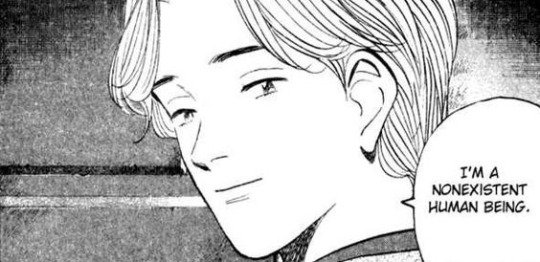
If a position of primary ontological security has been reached, the ordinary circumstances of life do not afford a perpetual threat to one’s own existence. If such a basis for living has not been reached, the ordinary circumstances of everyday life constitute a continual and deadly threat.
For an individual who’s unsure of his own existence, life becomes a constant struggle to preserve his self. All efforts are made to avoid engulfment, implosion, petrification. Fear of being absorbed is essentially fear of being understood, caught up, seen, loved, “grasped”.
To be understood correctly is to be engulfed, to be enclosed, swallowed up, drowned, eaten up, smothered, stifled in or by another person’s supposed all-embracing comprehension. It is lonely and painful to be always misunderstood, but there is at least from this point of view a measure of safety in isolation.
The way to deal with this fear is to take one’s true self out of the real world, completely out of reach of other people. A true self withdraws into the depths of the inner world, its connection with an individual’s body is interrupted. That which interacts with the “outside” world and controls actions, movements, words, facial expressions is the false self. A carefully falsified image designed to deflect the gaze of others.
…[he] never allows himself to ‘be himself in the presence of anyone else. He avoids social anxiety by never really being with others. He never quite says what he means or means what he says. The part he plays is always not quite himself. He takes care to laugh when he thinks a joke is not funny, and look bored when he is amused. <…> No one, therefore, really knows him, or understands him. He can be himself in safety only in isolation, albeit with a sense of emptiness and unreality. With others, he plays an elaborate game of pretense and equivocation. His social self is felt to be false and futile. - Laing describing his patient
However, another fear, of petrification, or objectification, clashes with the previous one. Fear of being absorbed makes one flee from the gaze of others, but by hiding from it, an individual ceases to be perceived by anyone, which once again puts their substantiality into question. An individual is very much afraid of being perceived by others as an object, as something inanimate, as a machine, as an “it” without subjectivity. It’s as if any potential observer is Medusa, who can instantly turn an individual to stone with a mere gaze. This fear pushes a person to “existential suicide” - he pretends to be “dead”, giving up his own autonomy before someone else can deaden him and treat him as an inanimate object. Also, as a way of protecting himself, an individual might turn everyone around him into stone too - because a phantom, hallucination, or an object couldn’t harm him, only real human beings are capable of such.
Fear of implosion is the same as fear of absorbing the real experience of life. An individual is empty, he is a vacuum - but this vacuum he begins to think of as himself. Any substantial relationship with the world and people threatens to “tear” him, so he avoids it, too.
Now let’s clarify what is false self, how it relates to the true one and the world.
If the individual delegates all transactions between himself and the other to a system within his being which is not 'him’, then the world is experienced as unreal, and all that belongs to this system is felt to be false, futile, and meaningless.
Here’s an illustration from “The Divided Self” to better visualize what is meant here.
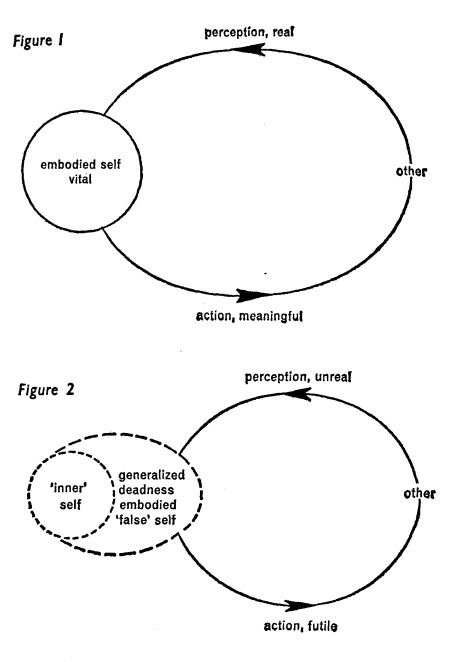
The reality of the world and of the self are mutually potentiated by the direct relationship between self and other. In Figure 2, there is a vicious circle.
the person who does not act in reality and only acts in phantasy becomes himself unreal.
The true self resides in an imaginary, devoid world of phantoms. It becomes unembodied, not represented in the real world. The real world, in return, loses its vitality in the eyes of a schizoid, viewed now as filled with objects.
The false self is a mask, a performance, an imaginary identity with little or nothing to do with the true self of the individual. Laing describes cases in which the false self starts to emerge in childhood and such children are described by their parents as remarkably obedient, compliant, undemanding. They conform perfectly to the expectations of the family and the environment. They begin to mockingly imitate what is desired of them. This is not necessarily an absurdly “good” image; it can also be absurdly evil, if that is what the world wishes the individual to be.
The point of having a false self is to not let any part of the true one slip to the real world, where an individual has no power over what will be done to it. To give something about him away is to rely on others mercy, and it’s a risk a schizoid can’t afford.
in reality, in 'the objective element’, nothing of 'him’ shall exist, and no footprints or fingerprints of the 'self shall have been left.
Now to the interesting part - how all of that correlates to Johan.
PART 2: ROOTS OF JOHAN’S ONTOLOGICAL INSECURITY
Firstly, of course, dressing up as a sister. He probably could sense already that it’s done for a reason, not for the fun of it. The family led “a quiet life”, which is probably difficult to do with two kids. So, my suggestion: the twins grew up with the feeling that they have to hide from some sort of danger and avoid attention. But, Anna didn’t have to hide her real appearance, unlike Johan, for whom pretending to be someone else became an important part of remaining safe.
Did he conceal as someone else, or was he only an imposter for the real human that for sure is present in the world?
Because everyone, besides mother and sister, only knew the sister, the girl, the daughter. She was definitely real. Was he really ever there?
Even the mother couldn’t tell them apart. He became an illusory twin.
The moment their mother hesitated could only solidify Johan’s intrusive thoughts. She had someone in mind, could it be that she hesitated because at that exact moment couldn’t tell where the kid she’d given up?
Did he only stand a chance to live, physically and existentially, only if he concealed as someone else? Because if people could see him for what he truly was, he would not be saved.
My guess is that Johan’s perception of himself was so distorted that he no longer thought of himself as the real thing; that the true self worth protecting wasn’t inside of him, it was his sister, and he was fake in his entirety. He was a mere pretender who had to ward off danger from the true self. Johan’s saying “I am you, and you are me” and referring to Anna as “my other self” indirectly confirms my assumption - he began to see himself and his sister as an integrated system, where he is nothing more than a facade and his sister is the living, real, substantial, human one.
The mother’s hesitance in choosing between the two children added fuel to Johan’s already flimsy sense of his own substantiality. What if she was not choosing between the twins, but simply could not at that moment figure out which one was which? Keeping a particular child in mind, she just couldn’t tell who was really the kid she was thinking of and who was posing as such? Where is the real child and where is the false one?
The feeling of insecurity, the loneliness, the pain of their mother’s abandonment, the sympathy for this sister, and the enormous guilt that the real one of them two had fallen into clutches of monsters. The twins’ whole life consisted of constant attempts of intruders to destroy their lives and identities.
The days after Anna’s return prior to being found on Czech-German border mark Johan’s existential death.
Something in him collapsed in that interval of time. When his mother was choosing between them, he was still a normal child (or, at least, nothing described in manga showed us his abnormality) - afraid of being abandoned by his mother, of being handed over to be torn apart by sinister strangers whose intentions were unknown, but from whom he’d been running for as long as he could remember. All these feelings died in him. When and how exactly, we don’t know, but a completely different Johan crosses the Czech-German border - detached, horrifyingly tranquil, indifferent to death. In a sense, he no longer has anything to fear, the short chain of events has been so devastating that he unknowingly committed existential suicide. Even if it’s death that’s awaiting them, no one will be able to put their hands on them, no one will be able to twist their souls and minds.
Laing’s patients often described their inner world as a wasteland, devoid of any sign of life. There are quotes from his book in which Laing talks about his patient and cites his words:
The self becomes desiccated and dead. In his dream world James experienced himself as even more alone in a desolate world than in his waking existence, for example:
“.. . I was standing in the middle of a barren landscape. It was absolutely flat. There was no life in sight. The grass was hardly growing. My feet were stuck in mud… ”
“. .. . I was in a lonely place of rocks and sand. I had fled there from something; now I was trying to get back to somewhere but didn’t know which way to go… “
Reminds us of something, doesn’t it?
And it’s a precise reflection of Johan’s world, the real Johan, where his self ended up imprisoned. However, he was a little luckier than the other schizoids - there was room for one more person in his world.
Mentally, Johan never made it out of that wasteland, only his body was saved. He calls this landscape a scenery of the Doomsday, not only because his body was close to death in that very space, but because it so strongly resembled Johan’s inner landscape. It was the last place his soul has seen.
PART 3: KINDERHEIM 511 AND THE LIEBERTS
One’s true self, residing in a world of phantoms, ceases to engage with the real world through the individual’s body. What is this body occupied with meanwhile?
Instead of being the core of his true self, the body is felt as the core of a false self, which a detached, disembodied, 'inner’, 'true’ self looks on at with tenderness, amusement, or hatred as the case may be. <…> The unembodied self, as onlooker at all the body does, engages in nothing directly.
This offers an answer as to why Kinderheim didn’t have the same destructive impact on Johan as it had on other children. His true self was already out of reach, it couldn’t be obtained no matter what they did to him externally.
They could get nothing from him. “They could only beat me up but they could not do me any real harm.” That is, any damage to his body could not really hurt him.
In a sad way, the experiments on Johan’s psyche were not successful, for he himself, quite unknowingly, subjected himself to all the horrors to which the Kinderheim warders were about to subject him.
You cannot kill what is dead, drain what’s empty, objectify what’s inanimate. That’s why they didn’t make it.
But Johan, of course, is the result they strived for but couldn’t achieve: a human so terrified and defenseless that is pushed to abandon his sensitivity in order to survive.
Thus, to forgo one’s autonomy becomes the means of secretly safeguarding it; to play possum, to feign death, becomes a means of preserving one’s aliveness. To turn oneself into a stone becomes a way of not being turned into a stone by someone else.
It seems to me that Johan was ready to settle down and stop running after escaping Kinderheim 511. But he left the orphanage with a critically dangerous revelation - sometimes it’s either you, or everyone else; his actions clearly show that he won’t hesitate to obliterate everything and everyone if it ensures safety. I just don’t think he expected to find himself in a similar position so soon, when he was adopted by Lieberts.
The thing about him is that he played along, he became what the world wanted him to become, yet it wasn’t enough to finally be left alone. The man they ran away from showed up at their doorstep and Johan lost his temper. Nothing helped the twins to escape monsters - living under different names, with different caregivers, in different places, together, separated- NOTHING was ever enough.
Maybe it was around the time his plan to be the last one standing was formed. Wiping out every sparkle of life from the world was the last attempt to gain safety.
Johan doesn’t care much about dying because his existential death has already happened, he already feels a lot more dead and frozen than alive. He already convinced himself that there’s nothing true about him, and out of two of them his sister is the true self. It doesn’t matter if he dies, he was never there from the start. But even after the gunshot he hopes to live through his sister.
Everything that comes after that wretched rainy night is an attempt to secure himself and his sister from the world that was on their tail for as long as they lived. He is ready to be separated from her and let her live under a different name if that’s how the monster finally loses track of her; he’s ready to enter the underworld, to take control of the German economy, to kill people.
It seems to me, because of the confinement of his true self in the realm of insubstantiality, he became unable to perceive people from the real world as alive and autonomous, that’s the sad reason why he could kill so easily. What he saw around were ghosts, objects that were mimicking human beings, not actual humans.
But there were exceptions.
Only Anna and Tenma are shown together with Johan in the wasteland of his inner world, where his true self dwells - them being there with him is a way of telling us, readers, that only these two truly know Johan. And therefore, only they can be spared.
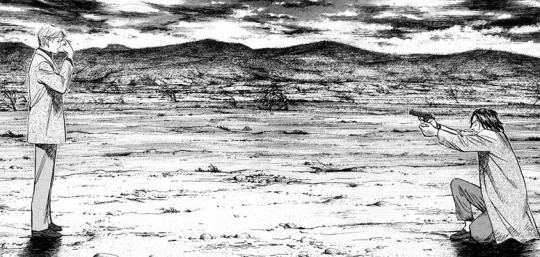
I just want to emphasize: for Johan, “destroying the world” and “be the last one standing” wasn’t something he did for fun, or just because he could. It’s the last endeavor of a tortured child convinced in hostility of all living things to find peace.
PART 4: THE TALE OF THE NAMELESS MONSTER
The self is, however, charged with hatred in its envy of the rich, vivid, abundant life which is always elsewhere; always there, never here. The self, as we said, is empty and dry. One might call it an oral self in so far as it is empty and longs to be and dreads being filled up. But its orality is such that it can never be satiated by any amount of drinking, feeding, eating, chewing, swallowing. It is unable to incorporate anything. It remains a bottomless pit; a gaping maw that can never be filled up.
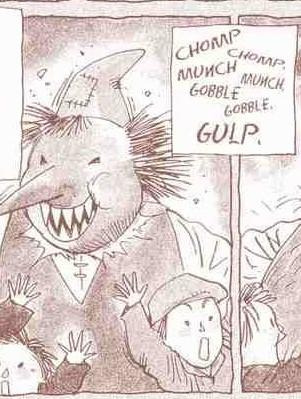
In the tale of the nameless monster, Johan can be both the monster and the boy who has been possessed by a foreign entity. That depends on how you interpret it.
This tale could be an allegory for what is happening to the twins, which are represented as nameless monsters. Johan could not remain himself, all the time hiding under different “faces”, changing names and identities. However, he couldn’t stay in any of them for long. His nature was bursting out, destroying these masks and whatever and whoever was around in the process. Nina on the other hand, even knowing her past, accepted the truth. Accepted her mother’s choice and hardships she had to endure. She no longer tries to appear to be someone else, having chosen to move on with her life.
A second interpretation: Johan-the-Prince and our Johan are both weakened boys on a brink of death. For each of them, letting the Monster in, something scary, unnatural to humans, was a way to survive. So our Johan suppressed his sensitivity and susceptibility by pretending to be a not-quite-human, until traces and even references to his humanity have all but disappeared.
I don’t think the fairytale manipulated Johan as a child, messing up his consciousness. What’s truly sinister about this picture book is that it foretold his fate.
As an adult, he picks up this book and sees himself in both the monster, who could not bear the present self and took on another’s form, and the boy, who in an attempt to survive has ceased to be human, has destroyed everything around him. All that remains is solitude.
Imageries of the prince and the monster merge into one, and in one thing they are similar - in a fear of losing their lives, they lied primarily to themselves, and that lie destroyed the being of each of them. Neither monster nor prince really saved what they were protecting so desperately.
In addition, the book itself was an object from Johan’s distant childhood, now almost forgotten, and served also as a reminder of the times when he was an ordinary, normal child.
Johan was wearing masks all the time, but the greatest of all his deceptions was not to live under the names “Johan Liebert”, “Franz Heinau”, “Erich Springer”, or any other for that matter. The most atrocious lie was to wear a mask of the nameless monster, even convincing himrself that this is who he is, that the emptiness and void is all there is to him. Wearing the guise of the nameless monster for years he had almost lost every memory of being human, and the book in his hands was a painful, violent reminder of his cowardly self-deception, his abandoned humanity, his forgotten self.
PART 5: I AM NOT YOU, AND YOU ARE NOT ME
From the moment the book falls into his hands, Johan probably realizes that his worldview is very much distorted. One of his fundamental beliefs about himself has been undermined, so debunking the rest of his illusions becomes a priority.
He remembers orchestrating the massacre at Kinderheim, but his belief that he was always capable of such things is shaken. He suspects that in his lost memories he will find the answer to the question he didn’t even think of asking. If he wasn’t born a monster, how did he become one?
We are not allowed to listen to the entire contents of the tape from Kinderheim 511. Only his attachment to Anna becomes apparent from it; but maybe he proceeds to talk about the Red Rose Mansion next. During interrogation he could recall his sister’s words, which he heard again and again after her return. Her story was told in the first person POV: “I saw <….> I heard <…> I was <…> I ran <…>”. On recording he could repeat verbatim the words of his sister, and then, as an adult listening to it, misunderstand the meaning of those words. After all, he heard himself saying “I was taken <…>, I saw people die <…> , I ran away…” And only on the basis of this would he latch on to the story about the Red Rose Mansion as an explanation for what he had become.
Johan then decides to destroy the place. Although he clearly doesn’t recognize it, it doesn’t ring the bell yet.
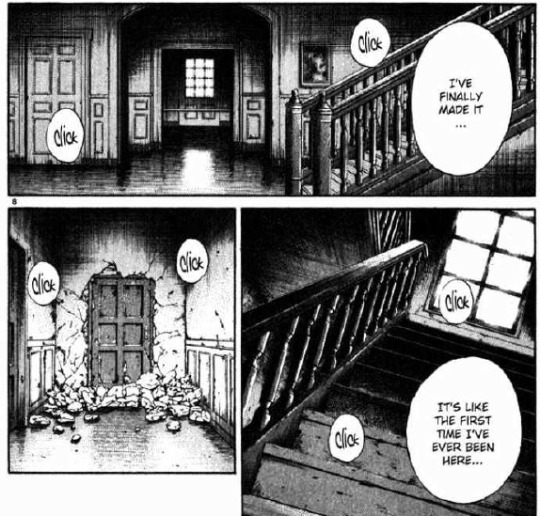

Johan at that moment still considers himself a single set of personalities with his sister, and believes that in his mother’s eyes they looked the same.
I can only assume that he told Čapek that Nina would kill him because he mistakenly thought that Nina held the same opinion about their connection as he did. If he’s willing to kill for her, she’ll do the same. Of course, he was wrong: he saw himself as an extension, a shadow of his sister, taking her joy and pain as his own; Nina, as much as she loved her brother, did not see herself and him as one, and clearly drew boundaries between her being and Johan’s.
The capacity to experience oneself as autonomous means that one has really come to realize that one is a separate person from everyone else. No matter how deeply I am committed in joy or suffering to someone else, he is not me, and I am not him.
The assumption of being taken away by Bonaparta and being cast aside by his mother was one of the last crutches guarding him from the horrifying truth - he was the one who turned himself into a monster.
He cries when he hears Nina’s story. Realizing that they’re not one, and she has never perceived Johan in this way. She is not his true self, and he is not his sister’s false self. He sees more and more clearly the outlines of the true self within him, and he does not like the picture emerging before him at all.
All the “saving” he was doing turned out to be a sham that didn’t bring any of the twins the expected result. He experienced the guilt of denying himself existence and grew so enraged that he decided to kill himself. He now saw his true self - destructive, without a good reason. And realized it had to be eradicated, along with the man, the Monster, who made him that way - Franz Bonaparta.
PART 6: RUHENHEIM
The final stage of Johan’s collapse, the massacre at Ruhenheim.
When he gets to Bonaparta’s old house and finds numerous sketches of him and his sister as children he understands that Bonaparta was not “a monster outside of him”.
He refers to him as such when meeting Čapek, implying that Franz is to blame for him becoming a murderer. Upon seeing these sketches he recognized that Bonaparta’s intentions had changed greatly over the years, and both Anna and himself were able to escape their fate because of his suddenly awakened sympathy. Not that this excuses Bonaparta, he was the one who designed the experiment after all. But these sketches were a confirmation of his kind intentions towards the twins, whatever they may have been at the outset.
It turns out that when Bonaparta came to visit the Lieberts, he was no longer a threat to Johan and Anna. Johan now knew that the night he shot the Lieberts had indeed stumbled and made a fatal mistake which tore him apart from Anna and plunged him deeper into the abyss of despair.
The event that finally convinced him of the animosity of the world and the lack of a safe corner anywhere in it was a figment of his mind which was led by fear.
This discovery was the final straw for Johan. Any image he had of himself collapsed for good.
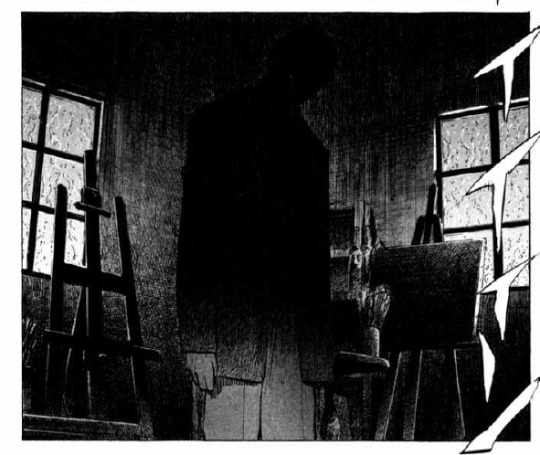
The ending of “Monster” is Johan’s realization of the fact that he undoubtedly Is. He exists, he is real, and he is him. And he was among the people who denied him the right to live; he was incapable of standing up for himself and recognizing his right to life, as his sister managed to do. He was so eager to erase any traces of himself from the world that didn’t notice the huge trail of blood dragging behind him, that was solid evidence of his existence, the only thing he had left.
He didn’t need to do horrible things that only left him and Nina traumatised. That left him all alone, miserable, separated from her.
He tried so hard to evade the evil people that he killed his Self before anyone had a chance to lay a hand on it.
When he set out to be nothing, his guilt was not only that he had no right to do all the things that an ordinary person can do, but that he had not the courage to do these things over and against and despite his conscience which sought to tell him that everything he did or could do in this life among other people was wrong. His guilt was in endorsing by his own decision this feeling that he had no right to life, and in denying himself access to the possibilities of this life.
After everything he learned about his past, Johan can’t forgive himself. For throwing himself into oblivion, for locking himself in the darkness. For making himself a monster that he was not born to be, that he had a chance not to become.
He was just as capable and deserving of normal life and real, deep connection with others as any other human being. He just convinced himself that he wasn’t one, and nobody dared to contradict him.
There is a desire in him to preserve not only himself from being consumed, but also those he cares about from himself. He thinks of his love as disastrous - because of it, Anna lost her brother and adoptive parents. Tenma, who saved him, was forced to be on the run for several years after becoming a murder suspect.
If there is anything the schizoid individual is likely to believe in, it is his own destructiveness. He is unable to believe that he can fill his own emptiness without reducing what is there to nothing. He regards his own love and that of others as being as destructive as hatred. To be loved threatens his self; but his love is equally dangerous to anyone else. His isolation is not entirely for his own self’s sake. It is also out of concern for others. <…>
…what the schizoid individual feels daily. He says, 'It would not be fair to anyone I might love, to love him.’ <…> He descends into a vortex of non-being in order to avoid being, but also to preserve being from himself.
He wishes to die now more than ever - a real death, this time. Not just existential, but total. The true end, as he called it.
Appearing in front of Bonaparta and Tenma, he doesn’t aim at Franz, because he no longer blames Bonaparta for what he has become.
Johan said the only thing everyone is equal in is death, and what was behind his words: he says to Tenma that not everyone is worthy of saving, of being loved and forgiven, and Tenma should’ve finally realized this after meeting him and really knowing him. Because he’s a monster, and being cheerful, having hope and light in their life is something that others can have, but he can’t; he’s completely out of this human world and the only thing he has in common with everyone else is that they are mortal and so is he.
But even in his death he is mistaken. Once again believing he has no right to exist, he hopes to laugh at the world one last time, and die at the hands of the man who once saved him. After all, he certainly wouldn’t have done it, knowing what Johan would grow up to be.
Isn’t that right, Dr. Tenma?…
Nina forgave him and the man who saved his life long time ago doesn’t regret his choice anymore and commits to it. The only people dear to him have recognized his right to live, whatever he may be.
Alas, how this affected him, we don’t know, and all we’re left with is speculation.
As a sentimental person, I want to believe that it meant something to Johan.
But what I really don’t doubt is that Johan by the end is a completely different character to the one he used to be. Broken, disarmed, miserable. But it’s finally truly him.
“I think I must have figured out how the show ended. The Magnificent Steiner, he probably, became human again.”
PART 7: THE FINAL ESCAPE

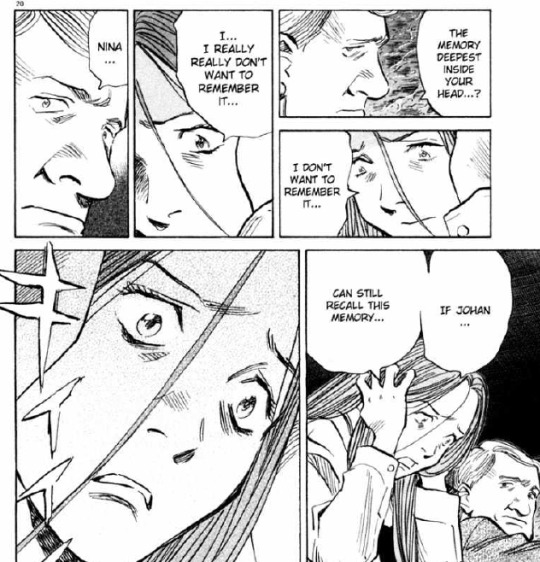
A mother plays a huge role in the development of her children’s ontological insecurity - sometimes by being outright dismissive, sometimes by simply enjoying the child’s undemanding and calm nature.
Here’s what you can read about the mother’s impact in “The Divided Self”, those are Laing’s reflections and descriptions of several of his patients.
… we suggest that a necessary component in the development of the self is the experience of oneself as a person under the loving eye of the mother.
His own feeling about his birth was that neither his father nor his mother had wanted him and, indeed, that they had never forgiven him for being born. <…> He was treated as though he wasn’t there.’ For his part, not only did he feel awkward and obvious, he felt guilty simply at 'being in the world in the first place’. His mother had, it seems, eyes only for herself. She was blind to him. He was not seen.
She had a great deal to say about her mother. She was smothering her, she would not let her live, and she had never wanted her.
Johan’s mother’s choice was the first one in the long list of his miseries, it also triggered his ontological insecurity. And how could it not arise when the mother herself abandoned one of her children?
However, Johan was unaware that his mother had thought up names for the two of them, even before he and Nina were born. It turns out that the arrival of the second child was not an unpleasant surprise to her, she was looking forward to having them both.
She had always acknowledged the existence of both her children, and in her eyes they certainly weren’t a one big entity divided by chance into two bodies, one of which was never meant to be there.
But Johan looks truly disturbed after listening to Tenma. And this new revelation could also be another beginning to despair.
There is a door that must not be opened. What lays behind it: a paradise, or another monster?
Tenma, by telling him that the mother had given names to both of them, might have brought Johan down to a new hell. Where the mother recognised the reality of both her children and yet seriously chose which of them to keep.
This sort of thing doesn’t happen in real life, but since it’s fiction we’re talking about, I think we should pay attention to the fact that Johan wakes up only after hearing Tenma’s words. There is a symbolic meaning of him being stuck between life and death for so long.
It’s like he was resisting to be alive again, refusing to stay awake, choosing to be in a coma rather than walk this Earth again. But yet he didn’t die - a part of Johan was holding onto life despite all the horrors it brought to him.
In his last waking moments, he was miserable after discovering all the truth about himself. He really wanted to die, he thought it was the only thing he was deserving of; but Tenma didn’t shot him, his sister forgave him - and it wasn’t the outcome he expected at all. It started an inner conflict he didn’t have the time to resolve.
Johan as well could see the memory of mother’s choice in a different light. By opening up to Tenma he admitted it as a serious enough cause for him to abandon his humanity, as he really was living in a world full of threats. Hiding and pretending came natural to a child that didn’t know any better. And his mother, however hurtful her choice was and how wrong was the very fact of it, loved both of her children, Johan knows that for sure now. Maybe, he could finally forgive himself for becoming a monster. There was no one left to blame for the way he had turned out, no one to take revenge on - even himself.
(I know it can be confusing, so I’ll clarify, just in case - by “forgiving himself” i don’t mean he simply dismissed the damage he did to others. He could only forgive the one he, with his own hands, inflicted upon himself, finally realizing, he had no other choice in his circumstances.)
He had a chance to accept that he had the right to exist all along, from the very beginning.
Finally, I want to get into the last excerpt from Laing’s book. These are his patient’s words from their conversation.
I could only be good if you saw it in me. It was only when I looked at myself through your eyes that I could see anything good. Otherwise, I only saw myself as a starving, annoying brat whom everyone hated and I hated myself for being that way. I wanted to tear out my stomach for being so hungry.
<…> Everyone should be able to look back in their memory and be sure he had a mother who loved him, all of him; even his piss and shit. He should be sure his mother loved him just for being himself; not for what he could do. Otherwise he feels he has no right to exist. He feels he should never have been born. No matter what happens to this person in life, no matter how much he gets hurt, he can always look back to this and feel that he is lovable. He can love himself and he cannot be broken. If he can’t fall back on this, he can be broken. You can only be broken if you’re already in pieces. As long as my baby-self has never been loved then I was in pieces. By loving me as a baby, you made me whole.
<…> It was terribly hard for me to stop being a schizophrenic. I knew I didn’t want to be a Smith (patient’s family name), because then I was nothing but old Professor Smith’s granddaughter. I couldn’t be sure that I could feel as though I were your child, and I wasn’t sure of myself. The only thing I was sure of was being a 'catatonic, paranoid and schizophrenic’. I had seen that written on my chart. That at least had substance and gave me an identity and personality. [What led you to change?] When I was sure that you would let me feel like your child and that you would care for me lovingly. If you could like the real me, then I could too. I could allow myself just to be me and didn’t need a title.
I walked back to see the hospital recently, and for a moment I could lose myself in the feeling of the past. In there I could be left alone. The world was going by outside, but I had a whole world inside me. Nobody could get at it and disturb it. For a moment I felt a tremendous longing to be back. It has been so safe and quiet. But then I realized that I can have love and fun in the real world and I started to hate the hospital. I hated the four walls and the feeling of being locked in. I hated the memory of never being really satisfied by my fantasies.
The above passage resembles Johan in many ways: the hunger he felt for real life, the doubt of being loved by mother, the bond which he developed with Tenma…. The last has to be special for Johan: the doctor didn’t simply let him off the hook in the end, he actively chose to save his life.
And just as Laing’s patient laments how difficult it was for her to give up the label of “crazy, schizophrenic” because it was the only description she felt could be applied to her, Johan couldn’t part with the mask of the nameless monster for the longest time. It was, after all, the only constant in his life. And now he knows that "nameless” part isn’t really true. Or maybe it doesn’t matter anymore. He is just him.
It’s up for a debate whether Johan chose life or death in the end. There’s evidence for both and this ambiguity is sure intentional on the author’s part.
I just want to believe it was a newfound hope that got Johan out of the hospital bed.
#naoki urasawa's monster#johan liebert#kenzo tenma#monster meta#schizoid personality disorder#dissociation#dissociative disorder#naoki urasawa's monster meta#monster
980 notes
·
View notes
Text
walker really wasn't lying when he said that percy was a double edged sword and every side of him had an opposite side too. there are times percy acts very slow, and some times he is the most brilliant strategist in the series. there are times when he cannot understand the other persons feelings, but there are times when he is the most emotionally intelligent character ever (like when he figured out the core dynamics of the legion members by one session and he was the only one in cotg to not lose his maturity when he turned seven). there are times when hes a humble and nice person, but there are times when he lashes out out of short temper. there are times when there are also times when he's acts like a giggly teenage girl dreaming about his kids, and there are also times when he's the most pessimistic bitter person with the whole 'im going to die in a few days, so what?' attitude. percy jackson really is a double edged sword
#im so happy the actors understand their characters so well#percy jackson#pjo#rick riordan#annabeth chase#percabeth#pjo fandom#percy jackon and the olympians#pjo tv series#annabeth percy jackson#heroes of olympus#pjo tv show#percy series#percy pjo#annabeth#percy and annabeth#pjo meta#pjo art#walker scobell#monster donut#podcast#percy x annabeth#percyjackson#pjo series#pjo spoilers#pjo tv#pjo tv spoilers#pjo tv adaptation#pjo show#grover underwood
3K notes
·
View notes
Text
Thinking about,,, Nami and her boys. The way the monster trio specifically are her protectors physically but she's their protector emotionally. Sanji is her pack mule and Zoro is her wall of meat and Luffy is her wild card, and she exploits this regularly, but a stranger should FEAR taking advantage of them on her watch bc these are HER idiots only. You better not test Sanji's kindness or Zoro's confidence or Luffy's joy. She'd kill for them if it came to it. She knows exactly what kind of encouragement they need. She's there with them after battles. She fully trusts her life in any one of their hands, but especially all three together. She has faith that they're strong and they're crazy and they're good. This is not to leave Usopp out--they have a different dynamic bc they're Squishy Human besties and that's worth its own entire post--but I love the Girl And Her Scary Entourage/The Idiots Under Her Wing energy she has with the monster trio.







#one piece#cat burglar nami#black leg sanji#roronoa zoro#monkey d luffy#monster trio#op meta#op screenshots#undescribed#but not necessary to the post. can be read without images
677 notes
·
View notes
Text

Gilly, Ygritte, and Monster in Winterfell
art by @shebsart, commissioned by me
Shebsart came through once again guys!!! I’m so excited ^_^
For about a year and a half, since I got into ASOIAF, I have admired Shebsart’s work. Their Theon in particular is the closest I’ve ever found to my vision of him, I adore his hooked nose (Asha’s too!). They also have such an amazing Barbrey design and the Starks, including Jon, are amazing. I have paid for some Ygritte commissions before with other artists, and I have liked all three of them, but when it comes to the closest look of what I think of when I imagine her book counterpart is some of Shebsart’s old pieces of her (and Jon). I was looking for someone to draw Gilly and Ygritte and there was nobody whose opinion that I held in higher regard than Shebsart, as they were my favorite ASOIAF artist, so I asked them if they had any recommendations of who had their commissions open. They told me they actually considering opening their commissions and I have been working with them ever since, even though as far as I know they have not formally opened commissions. Shebsart has been really great to work with and patient, even though there’s been some trouble with payment barriers since we live in very different parts of the world. They’ve been professional and worked hard.
I have long imagined the possibility of Gilly and Ygritte as friends; I thought it was high time I got it depicted in some way. I think it would really benefit Gilly if she had some female influences that weren’t family members. Of course, she does receive this to some extent, but I think it would be very interesting for her to find companionship with a girl around her age that shared the general Freefolk culture, although of course her upbringing was wildly different than Ygritte’s. We know that Ygritte has some sort of soft spot for young children, or at least some sort of moral code that keeps her from killing them. This is one trait shown in both the books and the show. In the show, while I don’t consider anything that happened to it as canon, she specifically spared Gilly and Monster knowing that the others around her would not. I don’t think it would be much of a stretch that Ygritte would grow attached to Monster and have a soft spot there, even though we know she hates incest and would therefore consider his conception an abomination. Everyone in ASOIAF is misogynistic to some extent and some of the things Ygritte says about women are toxic, but I would like to think she wouldn’t victim blame Gilly or call her a whore as Stannis did. I definitely see Ygritte as a strong woman who would want to protect and stand up for someone like Gilly. And Gilly has great compassion and is all around a good person, so I think a friendship would be good for the both of them.
In the depiction above, Ygritte is Queen in the North, consort to Jon. This fits in the same AU as my previous Jon and Ygritte commission by shripscapi. I’ve said this many times, I respect people who hate Jon x Ygritte and they have very valid reasons, but knowing Jon’s character, as long as Ygritte lives, which she would have in this AU as the Battle of Castle Black does not happen, there’s no other choice in Jon’s mind for consort for him as King Beyond the Wall. For the timeline of this art, Jon was first crowned King Beyond the Wall and he went South with his people to get away from and prepare to battle the Others, seeking help from other rulers. His men battle the Boltons and because neither Rickon or Bran have been found yet, he is declared King in the North as well for the time being. His residence is temporarily taken up in Winterfell and the Freefolk settle nearby in close quarters. Jon goes towards the Vale as he’s heard word about Sansa, but Ygritte stays behind with some of the Freefolk. This is when Gilly is her lady-in-waiting. I wanted to show that Ygritte’s clothes are nicer than Gilly’s, but I still wanted both outfits to be respectable. I wanted the fashion to be reasonable for a Northern climate, so that meant furs. Besides, they are both Freefolk and furs mean a lot to them culturally. I sent references for clothing and Shebsart went from there. Some people say Ygritte would never wear a dress but I disagree if it was comfortable enough and she was able to boss people around and be smug, I think she’d wear it as long as it was advantageous for her. And besides, I imagine that Jon designed the dress herself and that’s flattering enough for her to like it. What I did like to show is that Gilly is taking more towards traditional “ladylike” activities like embroidery, while Ygritte isn’t interested. She’d rather sit around and talk and laugh.
Oh, and isn’t baby Monster precious????
Edit: I’ve seen someone say they think Ygritte would hate her life if this is what it was like, and I’m not mad at it or anything, but I don’t agree!!! To clarify more about this AU, Jon becomes King Beyond the Wall because the Freefolk believe that only someone with Stark blood would be able to negotiate with the Others, so they’d be doomed without him. So therefore it’s not just about her feelings for Jon, she’s married to the person she believes will be able to save her people. The influence she has on him is also major and a source of pride for her. In the art above, she is living in Winterfell and yes she’s wearing a dress, but that isn’t her life forever. The reason she stays and doesn’t go with Jon to the Vale is not because she’s a woman and he refuses to let her fight, but because in the main timeline she has a child already (this art has a bit of a fudged timeline, if I were to write a fic on this idea she’d already have had a child before they breached the Wall) and if Jon were to die, the child still has Stark blood and would still be the only hope against the Others. If she had been South and had died with Jon (Jon doesn’t die at this point, but the prospect is why she stays behind), the child would have a regent with their own motivations and wouldn’t have its interests at heart like Ygritte would. This is an important role that I do think at the end of the day, despite Ygritte not being the smartest person, she would take pride and be protective over. It’s not simply that motherhood has changed her and is a role that took over her previous personality, because that’s not true. It’s that there are greater things at play and she’s a key part of protecting the source of the realm’s salvation, so to say. She doesn’t live at Winterfell forever and when at Winterfell, she does boss around some Lords but doesn’t do any chores that she would find tedious. The most she does is sew together a wolf plushie for her child, which was incredibly poorly done. When Bran and Rickon are eventually found and thus Jon doesn’t have the title of Winterfell, they settle in lands previously ruled by the Umbers and she doesn’t wear a dress anymore, I have another commission by shripscapi that shows her usual attire but it is furs, she does hunt, she teaches her children to hunt and falconry. Her traditions are not stomped out in favor of Southron traditions. Her home is not a castle, but a small home slightly more impressive than the huts of the rest of her people, inspired by architecture during the Norman invasion. All in all, she’s really happy. The most important thing to her is that her people are safe, the Others are going to be defeated, and they’ve gotten past the Wall, a goal of her people for a long time. I guess I’ve just had a different view of Ygritte and the Freefolk than majority opinion. I think the Freefolk are more adaptable than people in the South generally are, and it’s impressive how they rallied together despite their differences when faced with the Others. I don’t think the Seven Kingdoms would be able to do that. So I feel as if she, as well as most of her people, would be very happy and feel a sense of accomplishment for being able to live on and live among people that, before the threat of the Others, would never be able to tolerate them and vice versa.
#asoiaf#a song of ice and fire#game of thrones#ygritte#gilly#monster#valyrianscrolls#fanart#asoiaf meta
636 notes
·
View notes